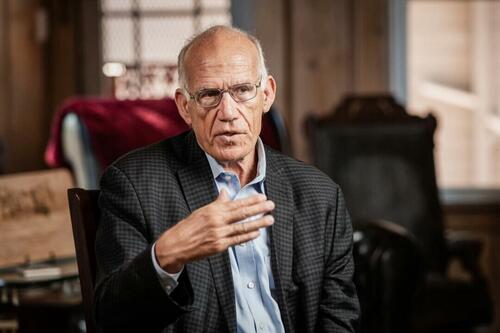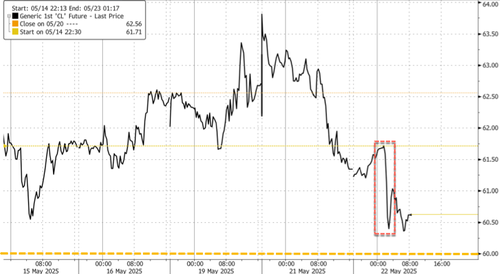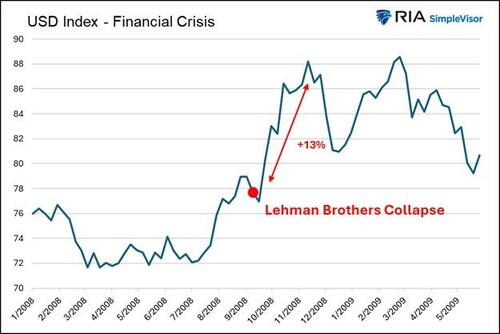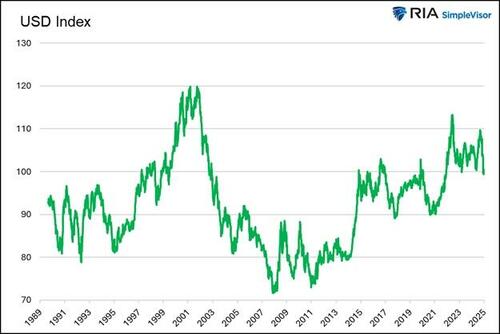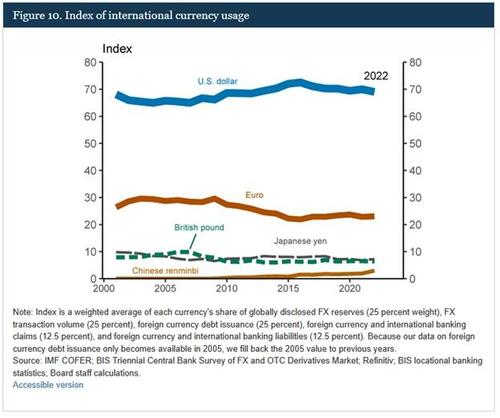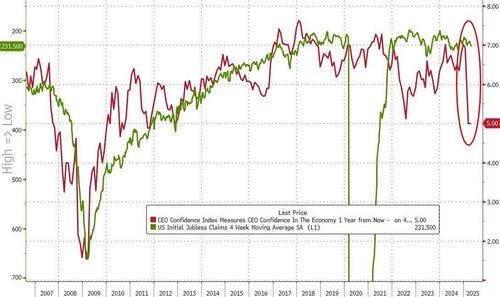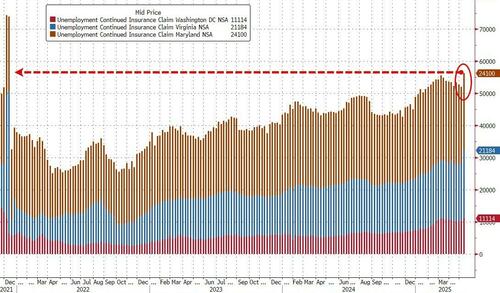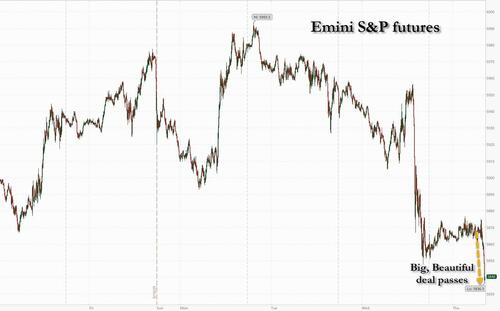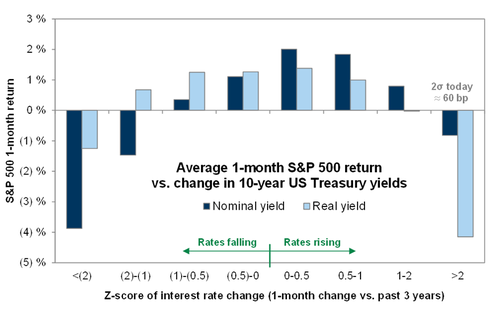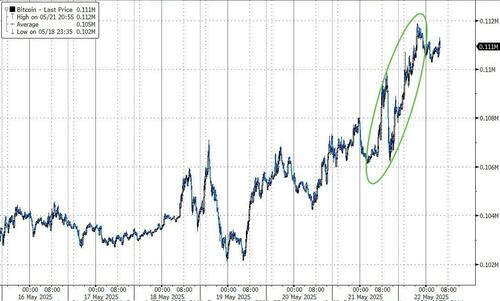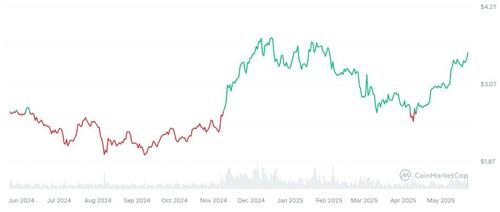It is sad that there are what you might call professional Catholics who make a living on their Catholicism, but in whom the spring of faith flows only faintly, in a few scattered drops. We must really make an effort to change this.
Distinction Matter - Subscribed Feeds
-
Site: LifeNews
A federal judge in Louisiana has struck down regulations that would have forced most U.S. employers to provide workers with time off and other accommodations to kill babies in abortions.
The ruling, issued Wednesday by U.S. District Judge David Joseph, invalidated a provision of the Equal Employment Opportunity Commission’s (EEOC) regulations under the Pregnant Workers Fairness Act (PWFA), which had been pushed during the Biden administration.
The PWFA, passed with bipartisan support in December 2022, was designed to ensure employers with 15 or more employees provide reasonable accommodations for pregnant workers, such as time off for medical appointments or relief from heavy lifting.
HELP LIFENEWS SAVE BABIES FROM ABORTION! Please help LifeNews.com with a donation!
However, the EEOC’s 2024 rule, approved in a 3-2 vote along party lines, sparked outrage among pro-life lawmakers and groups by classifying abortion as a “related medical condition” to pregnancy and childbirth.
Pro-life advocates argued this overstepped the law’s intent, forcing employers to facilitate the termination of unborn lives against their moral or religious convictions.
Judge Joseph, appointed by President Donald Trump, ruled that the EEOC exceeded its authority, stating that Congress did not explicitly include abortion in the PWFA’s scope, especially given its “enormous social, religious, and political importance.” He sided with plaintiffs, including the attorneys general of Louisiana and Mississippi, the U.S. Conference of Catholic Bishops, Catholic University, and two Catholic dioceses, who argued the rule violated state sovereignty and religious freedoms.
The ruling protects employers from being compelled to support abortions.
The vacated rule had required employers to grant time off for workers to obtain, prompting lawsuits from 17 states, including Tennessee and Arkansas, alongside pro-life organizations. Pro-life advocates, including the National Right to Life Committee, condemned the EEOC’s rule as an attempt to impose a “national abortion-accommodation mandate” under the guise of pregnancy protections.
While the abortion-related provision was struck down, the rest of the PWFA remains intact, ensuring accommodations for pregnancy-related needs like prenatal care. However, pro-life leaders see the ruling as a critical step in resisting federal overreach.

The post Judge Overturns Biden Rule Forcing Employers to Allow Time Off for Abortions appeared first on LifeNews.com.
-
Site: Catholic ConclaveIn a revealing interview with journalist Jonas Danner for the German media outlet Kontrafunk, Cardinal Gerhard Müller, Prefect Emeritus of the Congregation for the Doctrine of the Faith, offered a powerful intervention. During this conversation, the cardinal reviewed current ecclesial and political events. Over the course of an hour, he addressed topics of profound relevance, clarifying his Catholic Conclavehttp://www.blogger.com/profile/06227218883606585321noreply@blogger.com0
-
Site: PeakProsperityThere's a crisis afoot in the global long-bond markets. Japan's is melting down, while the rest are under pressure. Adding fuel to the fire, the Trump administration threw in the towel on controlling US fiscal deficits and now says the plan is to instead "grow the economy." Translation: More money printing and inflation, dead-ahead.
-
Site: Fr. Z's BlogEDITOR’S NOTE: Over the last few weeks, I have met readers who have come to Rome. Several have asked me how Bp. Fatty has been, since there haven’t been any entries from his diary. Dear readers, I can’t provide what … Read More →
-
Site: Catholic ConclavePaderborn: New elections for German lay people - who is running for electionThe Central Committee of German Catholics represents the concerns of Catholic lay people in Germany.The Central Committee of German Catholics is meeting in East Westphalia. What the lay representatives are discussing and who is running for election.The Central Committee of German Catholics (ZdK) is meeting in Paderborn inCatholic Conclavehttp://www.blogger.com/profile/06227218883606585321noreply@blogger.com0
-
Site: Novus Motus LiturgicusThis is the second part of an article by Dr Agnieszka Fromme about the theological censorship of certain ideas in the lectionary of the post-Conciliar rite; the first part was published yesterday. Our thanks once again to Dr Fromme for sharing her interesting work with NLM.4. Comparing the LectionariesThe following analysis is part of a broader project in which I examine the differences Peter Kwasniewskihttp://www.blogger.com/profile/02068005370670549612noreply@blogger.com0
-
Site: Henrymakow.com
 LAPD covered up for Jewish doctor responsible for multiple murders.He gave them kickbacks on the abortions he performed.His son exposed him.by Mike Stone(henrymakow.com)On January 15, 1947, the dead body of twenty-two-year-old Elizabeth Short was found naked and cut in half at the waist in a vacant Los Angeles lot. Because the victim had black hair and wore it in a way that resembled a dahlia flower, it came to be known as the Black Dahlia murder, a crime that both horrified and fascinated the public at the same time.When the killer began sending notes to local Los Angeles newspapers, taunting the police to catch him, and even went so far as to telephone the city editor of the Los Angeles Examiner, it set off a feeding frenzy of shock and awe among crime reporters and the already frightened public. Decades later, that interest hasn't waned.The official status of Elizabeth Short's murder is Unsolved. However, Steve Hodel, a retired LAPD homicide detective, has proved beyond a shadow of a doubt in his 2004 book Black Dahlia Avenger: A Genius for Murder that the Black Dahlia killer was actually his own father, George Hodel.
LAPD covered up for Jewish doctor responsible for multiple murders.He gave them kickbacks on the abortions he performed.His son exposed him.by Mike Stone(henrymakow.com)On January 15, 1947, the dead body of twenty-two-year-old Elizabeth Short was found naked and cut in half at the waist in a vacant Los Angeles lot. Because the victim had black hair and wore it in a way that resembled a dahlia flower, it came to be known as the Black Dahlia murder, a crime that both horrified and fascinated the public at the same time.When the killer began sending notes to local Los Angeles newspapers, taunting the police to catch him, and even went so far as to telephone the city editor of the Los Angeles Examiner, it set off a feeding frenzy of shock and awe among crime reporters and the already frightened public. Decades later, that interest hasn't waned.The official status of Elizabeth Short's murder is Unsolved. However, Steve Hodel, a retired LAPD homicide detective, has proved beyond a shadow of a doubt in his 2004 book Black Dahlia Avenger: A Genius for Murder that the Black Dahlia killer was actually his own father, George Hodel. The younger Hodel makes the case that his father was also responsible for numerous other "unsolved" murders, including the Red Lipstick murder, the Jean Spangler murder, and many more, and that the truth was hidden from the public each time. George Hodel never stood trial for any of the murders and lived to the ripe old age of 91.Who Was the Black Dahlia Killer?George Hodel was a prominent Jewish physician with a genius level IQ, working in Hollywood in the 1940s. His father was born George Goldgefter in Odessa in 1873. Goldgefter changed his name to Hodel, married a Jewish woman in Paris, and moved to America, where George Hodel, Jr. was born.George Jr. was a child prodigy, playing piano concerts at the age of nine and graduating from high school at the age of fourteen. He would grow up to up to be a womanizer, child molester, and murderer. It's a story with an amazing cast of characters.
The younger Hodel makes the case that his father was also responsible for numerous other "unsolved" murders, including the Red Lipstick murder, the Jean Spangler murder, and many more, and that the truth was hidden from the public each time. George Hodel never stood trial for any of the murders and lived to the ripe old age of 91.Who Was the Black Dahlia Killer?George Hodel was a prominent Jewish physician with a genius level IQ, working in Hollywood in the 1940s. His father was born George Goldgefter in Odessa in 1873. Goldgefter changed his name to Hodel, married a Jewish woman in Paris, and moved to America, where George Hodel, Jr. was born.George Jr. was a child prodigy, playing piano concerts at the age of nine and graduating from high school at the age of fourteen. He would grow up to up to be a womanizer, child molester, and murderer. It's a story with an amazing cast of characters. There's beautiful Eurasian Kiyo, left, the astrologer to the stars. Young Steve Hodel met Kiyo when he was in his early 20s, fell in love, and married her. She told him she was 28, and looked it. Turns out she was actually in her 40s. She'd had an affair with Steve's father, George Hodel, when she was twenty-years-old. George dumped her, so she married his son Steve decades later as a means of revenge. It's likely that at the time Kiyo married Steve, she knew that the elder Hodel was the Black Dahlia killer.There's Tamara Hodel, a teen temptress and Marilyn Monroe lookalike, and the daughter of George Hodel. He took nude pictures of her when she was thirteen, molested and impregnated her when she was fourteen, and then forced her to have an abortion. She ran away from home. When the cops found her, she told them what her father had done and a trial took place. Despite numerous witnesses who corroborated Tamara's story, George's lawyers ripped her to pieces on the witness stand and George was acquitted. After the trial, George immediately fled the country.There's John Huston, the famous movie director and an avowed sadist. He, too, plays a part in the proceedings. He tried to rape Tamara Hodel when she was eleven, and he had an affair with one of George's many wives. In fact, he's rumored to be the father of one of Steve Hodel's brothers.There's Fred Sexton, George's Jewish friend and partner in crime, and a boyhood friend of John Huston. He molested his own daughter from the ages of eight to eleven, molested his step-daughter when she was eleven, and likely assisted George in the rape, torture, and murder of over a dozen young white women.These people and more all played prominent roles in the Black Dahlia murder, along with an endless parade of loose women, disreputable reporters, and crooked cops.
There's beautiful Eurasian Kiyo, left, the astrologer to the stars. Young Steve Hodel met Kiyo when he was in his early 20s, fell in love, and married her. She told him she was 28, and looked it. Turns out she was actually in her 40s. She'd had an affair with Steve's father, George Hodel, when she was twenty-years-old. George dumped her, so she married his son Steve decades later as a means of revenge. It's likely that at the time Kiyo married Steve, she knew that the elder Hodel was the Black Dahlia killer.There's Tamara Hodel, a teen temptress and Marilyn Monroe lookalike, and the daughter of George Hodel. He took nude pictures of her when she was thirteen, molested and impregnated her when she was fourteen, and then forced her to have an abortion. She ran away from home. When the cops found her, she told them what her father had done and a trial took place. Despite numerous witnesses who corroborated Tamara's story, George's lawyers ripped her to pieces on the witness stand and George was acquitted. After the trial, George immediately fled the country.There's John Huston, the famous movie director and an avowed sadist. He, too, plays a part in the proceedings. He tried to rape Tamara Hodel when she was eleven, and he had an affair with one of George's many wives. In fact, he's rumored to be the father of one of Steve Hodel's brothers.There's Fred Sexton, George's Jewish friend and partner in crime, and a boyhood friend of John Huston. He molested his own daughter from the ages of eight to eleven, molested his step-daughter when she was eleven, and likely assisted George in the rape, torture, and murder of over a dozen young white women.These people and more all played prominent roles in the Black Dahlia murder, along with an endless parade of loose women, disreputable reporters, and crooked cops. Dorothy Huston Hodel (1906-1982) and Corinna Hodel - two wives of George Hodel.A Killer Walks FreePolice knew all along that George Hodel was the Black Dahlia killer, but he was closely aligned with a consortium of doctors performing illegal abortions for $250 a pop (a lot of money in those days), and his arrest would have exposed not only the abortion ring itself, but also dozens of cops on the take, and hundreds of local luminaries and Hollywood celebrities who'd had abortions performed. Such a massive citywide scandal could not be allowed, so George was allowed to walk free.There are many similarities between the Black Dahlia murder and the murders committed by Jack the Ripper in London 60 years before. Both were rumored to be acts of Jewish ritual murder. Both murderers boasted of their deeds and dared the police to catch them. Neither killer was ever brought to justice.As a true-crime tour de force, Steve Hodel's book ranks right up there with The Franklin Coverup by John DeCamp, a book you will never forget.----Mike Stone is the author of the new book REAL or FAKE: The Donald Trump Assassination Attempt and Teen Boy's Success Book: the Ultimate Self-Help Book for Boys; Everything You Need to Know to Become a Man
Dorothy Huston Hodel (1906-1982) and Corinna Hodel - two wives of George Hodel.A Killer Walks FreePolice knew all along that George Hodel was the Black Dahlia killer, but he was closely aligned with a consortium of doctors performing illegal abortions for $250 a pop (a lot of money in those days), and his arrest would have exposed not only the abortion ring itself, but also dozens of cops on the take, and hundreds of local luminaries and Hollywood celebrities who'd had abortions performed. Such a massive citywide scandal could not be allowed, so George was allowed to walk free.There are many similarities between the Black Dahlia murder and the murders committed by Jack the Ripper in London 60 years before. Both were rumored to be acts of Jewish ritual murder. Both murderers boasted of their deeds and dared the police to catch them. Neither killer was ever brought to justice.As a true-crime tour de force, Steve Hodel's book ranks right up there with The Franklin Coverup by John DeCamp, a book you will never forget.----Mike Stone is the author of the new book REAL or FAKE: The Donald Trump Assassination Attempt and Teen Boy's Success Book: the Ultimate Self-Help Book for Boys; Everything You Need to Know to Become a Man -
Site: OnePeterFive

So, having said all this, let’s hazard a general summary of the various “clans of Tradition.” At the risk of oversimplifying, I’m going to break the clans into three. The reason is that this is a helpful historical framework, because it provides a general historical concept, which then allows us to identify various subsets, or “families” which fall under each clan. As I said in part II…
-
Site: Catholic ConclaveOn Monday 26 May, as part of the “Living with Care” series, the meeting entitled “Ecology: the legacy of Pope Francis” will be held, an opportunity to reflect on the Pontiff’s contribution to ecological thought. A month after the funeral of Pope Bergoglio, the influence that his teaching has had in recognizing the ecological crisis as an ethical and social challenge will be explored. The first Catholic Conclavehttp://www.blogger.com/profile/06227218883606585321noreply@blogger.com0
-
Site: The Remnant Newspaper - Remnant ArticlesFor those defenders of the Vatican II revolution who consider Paul VI to be a saint, there should be little justification for resisting his 1968 Credo. But the need for Leo XIV to boldly proclaim these truths can be measured by the extent to which they have today been abandoned even by those men who purport to revere the legacy of Paul VI.
-
Site: LifeNews
House Republicans delivered on their promise to defund Big Abortion on Thursday by passing the budget reconciliation bill that has consumed Washington’s attention for the past three months.
In the bill, the House GOP removed Medicaid funding for Planned Parenthood, the largest provider of abortions in the country. The effort had been supported by dozens of pro-life legislators from around the country.
The move is a monumental win for pro-lifers because Planned Parenthood receives more than one-third of its overall funding from the U.S. government through grants, contracts, and Medicaid reimbursements. That translates to about $2 million per day, which taxpayers are on the hook for. Furthermore, taxpayer funding for the organization has been on an upward trajectory for about the past dozen years, having increased by 50% since 2013.
HELP LIFENEWS SAVE BABIES FROM ABORTION! Please help LifeNews.com with a donation!
But the House reconciliation bill halts that trend by ending the flow of Medicaid dollars to Planned Parenthood, except in abortion cases for rape or incest. Planned Parenthood is also a major provider of hormones for so-called transgender transitions in the country, which means defunding it is also combating the organization’s efforts in that regard as well.
“One of the largest providers of hormones for gender-transition procedures can no longer receive federal funding [from Medicaid],” Connor Semelsberger, a government relations director at The Heritage Foundation, told The Daily Signal.
That gets Planned Parenthood “out of our pockets, not just, you know, for the sliver of money that would be spent on abortions, but for everything they’re doing, because they’re not a ‘good government’ partner,” Katie Glenn Daniel, director of legal affairs and policy counsel at Susan B. Anthony Pro-Life America, told The Daily Signal.
“Planned Parenthood alone performs 400,000 abortions every year, and if you look at their own press releases, they talk about how reliant they are on our taxpayer dollars, so it’s more than time for them to get off the government dole,” Daniel said.
Semelsberger emphasized that the language defunding Planned Parenthood was for the maximum time that the House could do so under reconciliation, which is 10 years.
Planned Parenthood for its part has publicly opposed the bill, with its president, Alexis McGill Johnson, saying in part that the bill was “about punishing Planned Parenthood health centers for providing abortion care.”
A recent study found that Planned Parenthood facilities are outnumbered by community health centers at a 15-to-1 ratio across the country, meaning that many Americans can choose many other options for their health care.
“There is no excuse for forcing taxpayers to prop up a scandal-ridden industry that prioritizes abortions, gender transitions, and partisan political activism, instead of prenatal care, cancer screening, and other legitimate health services that are in continual decline,” Marjorie Dannenfelser, the president of the Susan B. Anthony Pro-Life America, said on Thursday.
The action in the House shows the persistence and effectiveness of pro-life advocates even after the overturning of Roe v. Wade in 2022.
Terry Schilling, president of the American Principles Project, a pro-family organization, praised the Republicans in a statement.
“This morning, President [Donald] Trump and [House Speaker Mike] Johnson delivered for the American family! The One Big, Beautiful Bill that passed the House will end taxpayer funding for gender-transition surgeries, defund Planned Parenthood, and increase the Child Tax Credit—all are monumental wins for our great nation,” Schilling said, adding:
“Now it is time for the Senate to get this bill across the finish line, so we can Make Families Great Again.”
LifeNews Note: Jacob Adams is a journalism fellow at The Daily Signal, where this column originally appeared.

The post One Big Beautiful Bill Will Stop Planned Parenthood Abortion Biz From Getting $2 Million Every Day appeared first on LifeNews.com.
-
Site: Catholic ConclaveAt their last meeting, the members of the Synodal Committee agreed on a framework for a future synodal body. All diocesan bishops are to be represented on it. Four of them are surprised by this.Quick Synod Mass almost interrupted the conference. No one had to even move from their seatsArchbishops Gregor Maria Hanke, Stefan Oster, Rudolf Voderholzer, and Rainer Maria Woelki also do not want Catholic Conclavehttp://www.blogger.com/profile/06227218883606585321noreply@blogger.com0
-
Site: Zero HedgeVenezuela Suspends Flights From Colombia To Prevent 'Entry Of Mercenaries'Tyler Durden Thu, 05/22/2025 - 15:40
Authored by Yeny Sora Robles via The Epoch Times (emphasis ours),
Venezuelan Security Minister Diosdado Cabello on May 19 announced the suspension of flights from Colombia due to the possible entry of “mercenaries,” days before the legislative and regional elections scheduled for May 25..
 A passenger shows a Venezuelan passport as he waits for news after the cancellation of his flight to Caracas at El Dorado International Airport in Bogota on May 19, 2025. Venezuela's ruling reghime said on that day that it had suspended flights arriving from neighboring Colombia after what it called a cross-border infiltration of "mercenaries" allegedly planning to disrupt upcoming legislative and regional elections on May 25. Raul Arboleda/AFP via Getty Images
A passenger shows a Venezuelan passport as he waits for news after the cancellation of his flight to Caracas at El Dorado International Airport in Bogota on May 19, 2025. Venezuela's ruling reghime said on that day that it had suspended flights arriving from neighboring Colombia after what it called a cross-border infiltration of "mercenaries" allegedly planning to disrupt upcoming legislative and regional elections on May 25. Raul Arboleda/AFP via Getty Images
Cabello claimed these “mercenaries” are part of a plan to destabilize the country.
“We have given instructions that all flights from Colombia to Venezuela be immediately suspended because the information we have is related to this type of movement of people,” Cabello said in a televised broadcast.
“These are people who come with clear objectives and will enter Venezuela like any other tourist,” he added.
The elections for governors, state legislators, and National Assembly deputies are marked with questions about the legitimacy of Nicolás Maduro’s presidency following allegations of electoral fraud and state repression after the July 2024 presidential elections.
A May report from the Organization of American States documented an increase in human rights violations targeting the opposition, including the state’s use of widespread enforced disappearance as a tool of repression.
The report said electoral repression in Venezuela has reached a critical turning point and gave examples such as state-confirmed murder of protesters, an unprecedented scale of arbitrary detention accompanied by reports of torture and sexual violence, as well as the formal integration of “Colectivos”—armed civilian groups that function as state-enabled actors engaging in home invasions, beatings, arrests, and extrajudicial killings.
38 People Arrested
In his broadcast, Cabello also stated that the Venezuelan regime has arrested 38 people in recent days, of whom 17 are foreigners and 21 are Venezuelans. The broadcast, without presenting evidence, said the individuals had intended to detonate explosives in Venezuelan consulates, hospitals, and public service entities, as well as to attack officials of the current Venezuelan regime, with the aim of “sabotaging” the legislative and regional elections.
Cabello, also without providing evidence, accused Venezuelan opposition leader María Corina Machado and Iván Simonovis Aranguren, a former political prisoner living in the United States, of participating in “conspiracy and terrorism” activities against Venezuela.
Machado and Simonovis have not responded to Cabello’s statements and did not respond to a request for comment by the time of publication.
The Colombian Foreign Ministry confirmed in a statement posted on social media platform X that it had received information from the Venezuelan regime to suspend general and commercial aviation flights from Colombia for national security reasons until 6 p.m. May 26. “To date, the Colombian Foreign Ministry has not received information regarding the arrest of Colombian citizens,” it said.
LATAM Airlines Colombia announced in a statement the cancellation of flights between Venezuela and Colombia from May 19 to May 26, following the Venezuelan regime’s decision.
Another airline, Avianca, announced the cancellation of flights on the Colombia–Venezuela route from May 20 to 25.
-
Site: Catholic ConclaveFreiburg: Young female theologians demand admission to the seminaryThe church only ordains men. Why women still applied to Baden.Nine female theology students have submitted their applications to the Freiburg Seminary. They feel called to become priests and want to support people as pastors in both happy and difficult times, as one of the women told the "Badische Zeitung." Their applications to Catholic Conclavehttp://www.blogger.com/profile/06227218883606585321noreply@blogger.com0
-
Site: LifeNews
National Right to Life applauds the House passage of the “One, Big Beautiful Bill.” The bill would eliminate federal funds from being used to fund the multibillion-dollar abortion industry and organizations like Planned Parenthood.
The following is a statement from Carol Tobias, president of National Right to Life.
We praise Speaker Mike Johnson, House leadership, and congressional members who put American taxpayers first by passing the “One, Big Beautiful Bill.” This bill would put the brakes on federal funding of the abortion industry.
Get the latest pro-life news and information on X (Twitter). Follow @LifeNewsHQ//
Planned Parenthood, the nation’s largest abortion provider, is also one of the nation’s most successful “non-profits” – raking in over $2 billion in revenue every year. It is time that Planned Parenthood, and organizations like it, stop receiving tax dollars from hardworking Americans.
As the nation’s single largest abortion provider, Planned Parenthood took the lives of over 400,000 unborn babies last year and reached this monstrous goal with the help of American taxpayers. In the 2023-2024 fiscal year for the abortion giant, $792.2 million (39%) of Planned Parenthood’s revenue came from taxpayers in the form of “Government Health Services Reimbursements & Grants.”
It is time our tax dollars stop helping the abortion industry hurt women and take the lives of their innocent preborn children.

The post Pro-Life Group Thanks Speaker Mike Johnson for Getting Planned Parenthood Defunding Bill Approved appeared first on LifeNews.com.
-
Site: LifeNews
A resolution submitted to the Southern Baptist Convention (SBC) gives the nation’s largest Protestant denomination an opportunity “to speak with moral clarity” against the fastest growing method of abortion, said David Closson, director of FRC’s Center for Biblical Worldview and the resolution’s primary author. “Currently, more than 60% of abortions in the United States are carried out using chemical abortion pills. These drugs are fatal to unborn children and pose serious health risks to women,” he told The Washington Stand.
For two days (June 10-11), messengers from Southern Baptist churches will convene in Dallas, Texas, for their annual convention. Closson submitted the resolution to the SBC Committee on Resolutions before the May 22 deadline. The committee may “combine, title or retitle, and reword submitted resolutions” before presenting them to the full convention for discussion and approval.
This year, the Committee on Resolutions is chaired by Dr. Andrew Walker, professor of Christian ethics and public theology at Southern Baptist Theological Seminary, who has publicly commented on the dangers of the abortion pill. But the committee is comprised of 10 members from seven states, and it remains to be seen which resolutions these 10 people will agree to prioritize.
Get the latest pro-life news and information on X (Twitter). Follow @LifeNewsHQ//
“Southern Baptists have consistently affirmed the value and dignity of every human life, and recent resolutions reflect our strong pro-life convictions,” Closson explained. The Southern Baptist Convention has approved at least 25 pro-life resolutions condemning abortion and supporting mothers and their children, dating back to 1980.
“To date, however, the Southern Baptist Convention has not adopted a resolution focused solely on the issue of chemical abortion,” Closson added.
The proposed resolution, “On the Medical Dangers and Moral Evil of Chemical Abortion,” attempts to fill that gap. The draft urges “the Food and Drug Administration (FDA) to immediately reevaluate and suspend its approval of the two-pill chemical abortion regimen of mifepristone and misoprostol.” In the interim, it encourages the FDA “to immediately reinstate the full Risk Evaluation and Mitigation Strategy (REMS) that was originally established in 2011 for the regulation of mifepristone.”
The proposed language further implores “elected officials at every level of government to enact policies that prohibit the sale or distribution of chemical abortion drugs, including the mailing of such drugs across state lines in violation of duly enacted pro-life laws.” On January 31, a Louisiana grand jury indicted a New York-based physician who mailed abortion pills across state lines, sending a teenage mother — who was coerced into taking the pills — to the hospital with severe complications. New York authorities subsequently refused to extradite the accused.
In addition to these government actions, the proposed resolution also contemplated action by Christians. It condemned “the use, promotion, and expansion of chemical abortion as a grave moral evil that ends the lives of innocent preborn children and exploits women.” On this basis, it lamented and grieved the ongoing travesty of abortion, encouraged pastors and churches “to equip their congregations to care for women facing unexpected pregnancies with compassion, practical support, and the life-giving hope of the gospel,” and committed “to pray for the end of all forms of abortion.”
It laid out the ethical basis for these calls to action, beginning with Scripture’s teaching that “all human life is sacred, created in the image of God from the moment of fertilization (Genesis 1:27; Psalm 139:13–16).”
The proposal also noted with alarm the growing prevalence of chemical abortion, which “now accounts for the majority of abortions in the United States, leading to the deaths of hundreds of thousands of preborn children each year,” and “severe adverse events” for more than 10% of women who ingest the drugs according to recent studies. Easy access to chemical abortion drugs supports their use “without direct medical supervision” and allows “malefactors” to exploit women, it continued.
“Scripture commands God’s people to ‘rescue those being taken away to death’ and to ‘hold back those who are stumbling to the slaughter’ (Proverbs 24:11),” the proposed resolution declared.
Resolutions approved by the messengers of the Southern Baptist Convention are not binding on Southern Baptist agencies or churches. Southern Baptists practice congregational church polity, which means that each individual church has its own independent governmental structure. The denomination only exists to promote “friendly cooperation” over issues such as sending missionaries, preserving doctrinal fidelity, and — to a lesser extent — speaking with a united voice to pressing cultural issues where Christian ethics are implicated.
However, Closson argued that “resolutions matter because they give our convention a unified voice to speak with moral clarity on urgent cultural and policy issues.” In 2024, the SBC passed one “On the Ethical Realities of Reproductive Technologies and the Dignity of the Human Embryo,” which articulated a pro-life, Christian perspective on in vitro fertilization (IVF) and related reproductive technologies while these procedures were being debated both in Congress and state legislatures. Closson noted that the Southern Baptist IVF resolution was reported on widely, even in mainstream media.
Chemical abortion remains a cultural flashpoint and a politically live issue. Earlier this year, Secretary of Health and Human Services Robert F. Kennedy Jr. promised Republican senators that he would “study the safety of mifepristone,” the first of two drugs used in chemical abortion, and FDA Commissioner Marty Makary agreed to review new evidence regarding the safety of mifepristone. Kennedy further stated last week that he has ordered the FDA to conduct a “complete review” of the abortion drug.
The Trump administration is the first to assume office since the Supreme Court overturned Roe v. Wade in its decision, Dobbs v. Jackson Women’s Health Organization (2022). As Closson detailed in his recent book, “Life after Roe,” the Dobbs decision reshaped the legal and political landscape of the life issue. The Trump administration is still grappling with the implications of this decision.
For its part, the Southern Baptist Convention has not approved any pro-life resolutions since Dobbs. At the 2024 Southern Baptist Convention, a proposed resolution “On the Pro-Life Ethic in a Post-Roe Society” called for “robust regulation with the ultimate goal of abolishing all abortions including the dangerous, life-ending chemical abortion drugs used in elective abortions.” That resolution was not among the eight approved by convention messengers, reportedly due to time constraints. Besides the 2024 IVF resolution, the convention last passed a pro-life resolution in 2022, which anticipated the overturn of Roe v. Wade.
Closson hopes that the proposed chemical abortion resolution would play a role similar to the IVF resolution, applying Christian doctrine to live cultural and political controversies in an eye-catching and influential way. “My hope,” he told TWS, “is that the messengers in Dallas will have an opportunity to take a clear and courageous stand against what has become the dominant method of ending unborn lives.”
LifeNews Note: Joshua Arnold is a staff writer at The Washington Stand, contributing both news and commentary from a biblical worldview. Originally published by The Washington Stand.

The post Southern Baptist Church Resolution Would Target Dangerous Abortion Pills That Kill Babies appeared first on LifeNews.com.
-
Site: LifeNews
Democrats have suggested that everything’s on the table when it comes to rebuilding their brand. But do they mean it? Months into November’s messy autopsy, party officials might not like the ugly truths members are raising behind closed doors — especially when they threaten the far-Left’s sacred cows.
While it’s widely accepted that trans extremism cost the Democrats dearly in 2024, there are rumblings that gender ideology wasn’t the only issue dragging the party down. What if, after three years of fundraising and fearmongering, abortion has become a political liability too? It’s probably hard for DNC strategists to fathom after Dobbs, but the issue that helped them string together so many midterm and state-level wins may finally be turning voters off.
It’s not that Americans don’t share the party’s desire to keep abortion legal, too many do. But keeping it legal and celebrating the killing through all nine months of pregnancy are two very different things. Maybe in Kamala Harris, the nation finally realized that Democrats weren’t just defending abortion — they were reveling in it. What others approached with somber and appropriate seriousness, their standard-bearers gleefully embraced as another rite of womanhood. As millions of mothers grieve what abortion cost them, Harris’s party continues to respond with an outsized enthusiasm for the carnage.
Get the latest pro-life news and information on X (Twitter). Follow @LifeNewsHQ//
That disconnect has gotten increasingly uncomfortable, some experts believe. Regular people struggle with the moral weight of this issue — and somewhere along the way, that reality got lost. “After the 2024 election,” Family Research Council’s Mary Szoch told The Washington Stand, “Democrats realized that your average American actually hates hearing about killing an unborn child at nine months.” Even before that, in 2016, when Donald Trump described, in chilling detail, the kind of dismemberment abortion that Hillary Clinton endorsed, it was a turning point in the campaign. “With what Hillary is saying, in the ninth month, you can take the baby and rip the baby out of the womb of the mother just prior to the birth of the baby,” Trump said. “Now you can say that that’s okay, and Hillary can say that that’s okay, but it’s not okay with me.”
It’s also “not okay” with the majority of Americans, who don’t share the Democratic Party’s delight in ruthlessly executing unborn children. In the most recent Marist survey (2025), 67% of the 1,387 adults surveyed agreed there should be limits on abortion, including 55% of self-described “pro-choicers.” While Harris and company proudly support the practice up to (and even after) the moment of birth — at taxpayers’ expense — the average voter isn’t an abortion zealot. Even after the overturning of Roe v. Wade, most people have a very difficult time justifying the slaughter of innocent children after the first trimester, if at all. To them, the Democrats’ eagerness to push the boundaries of this barbarity is off-putting at best and disturbing at worst.
And partygoers are taking note. When Time magazine went inside “the Democrats’ reboot” in their latest issue, some of the most revealing parts were the interviews that author Charlotte Alter had with party members that hinted at this same problem. In many ways, the Left has misread people’s concern about abortion being outlawed as a full-throated endorsement for the procedure anytime, anyhow, anywhere. This surfaced in some of Alter’s conversations with Democrats in Congress, some of whom refused to go on the record.
“Many Democratic officials believe the party moved too far left on social issues in particular,” she wrote. “‘There are some sports where trans girls shouldn’t be playing against biological girls,’ says one lawmaker, adding that most of his fellow Democrats agree but are ‘afraid of the blowback that comes from a very small community.’” Alter adds, “Even abortion is up for a rethink. Some Democrats want a retreat from the enthusiastic embrace of abortion rights, and a return to talking about abortion as ‘safe, legal, and rare,’ as Bill Clinton put it.”
Quietly, more rank-and-file Dems worry about the party’s over-the-top appetite for a procedure that violently destroys a human life. “‘Refusing to say that even in the third trimester there’s no limits on it, it’s not where the average American is,’ says another Democratic lawmaker. ‘The really embarrassing truth is Donald Trump is closer to the median voting on abortion than Democrats were.’ Yet,” Alter noted, “the fact these lawmakers would only share these thoughts without their names attached shows how much Democrats still fear antagonizing their liberal base.”
That jives with what a lot of politicos said in the aftermath of November’s election. Unfortunately for Democrats, not only did they play the abortion card poorly, but it was also, to most people’s surprise, the only card they played. It was easier, Virginia Republican strategist Zach Roday warned, to wage war “on just one single issue that favors Democrats … in the [2022] midterms” — when the Supreme Court’s ruling was fresh on people’s minds. D.J. Quinlan, who served as a former executive director for the Arizona Democratic Party, also believes “there’s room for a conversation” on “whether talking about abortion at the expense of everything else, particularly the economy, might have been a contributing factor” in November’s shellacking.
Others in the Republican Party stressed that Americans aren’t one-dimensional voters. Maybe, Ford O’Connell suggested, women were insulted by the insinuation that their uterus is the only thing they should care about. “People don’t want to be put in boxes or told what to think,” he insisted. “They want to be heard.”
Those brave enough to challenge the radical views of the Democratic Party openly, like New York Representative Ritchie Torres (D), recognize the losing ground they’re standing on. Most of these lawmakers, Alter explains, “acknowledge that the progressive movement encouraged a kind of purity policies that hampered the party’s ability to win majorities. ‘We swung the pendulum too far to the left,’” the Bronx congressman warns. In his own district, he’s watched with alarm as Trump makes more inroads with “working-class people of color, as he did in cities around the country.”
That will only continue if the party of Biden and Harris refuses to recognize that this reckoning was about a lot more than Donald Trump. It’s about their fundamental failure to course-correct when their values veer into the diabolic. As Time reiterated, “Democrats could dismiss Trump’s first win as a fluke. His second, they know, was the product of catastrophic failure — a nationwide rejection of Democratic policies, Democratic messaging, and the Democrats themselves.” The reality is, Alter noted, “The party got skunked in every battleground state and lost the popular vote for the first time in 20 years. They lost the House and the Senate. Their support sagged with almost every demographic cohort except Black women and college-educated voters. Only 35% of Democrats are optimistic about the future of the party…”
When Harris couldn’t convince voters that the economy, illegal immigration, and crime weren’t really problems, FRC Action Director Matt Carpenter insisted to TWS, “they pivoted to pro-abortion rhetoric.” And it wasn’t just “Democratic politicians who relied heavily on the party’s pro-abortion platform, but big donors also contributed vast sums of money to pro-abortion ballot initiatives in an attempt to galvanize their base.”
And frankly, he continued, “The fact that Democratic politicians have to speak anonymously to friendly media in order to gently signal to their base: ‘Hey, maybe we need to back off a little of the extreme social policy’ shows that Democratic members know the party has crossed a line with voters. These members simply don’t have the courage to lead their party away from the extreme pro-abortion, pro-trans lobbies.”
But political expedience is just one part of the equation. “Unfortunately,” Szoch said, “it doesn’t seem that Democrats have realized the reason they need to change their position on abortion is because an unborn child is a human being. Instead, Democrats want to change their position to gain votes,” she lamented. “This lack of authenticity is what makes voters disgusted with career politicians. It’s what got President Trump elected. I hope that one day Democrats see unborn children as human beings — not as an avenue to getting more votes,” Szoch implored. “But until they do, I hope the American people are smart enough to continue voting them out of office.”
LifeNews Note: Suzanne Bowdey serves as editorial director and senior writer at The Washington Stand, where this originally appeared.

The post Democrats are Too Radical on Abortion. Americans Don’t Want Abortions Up to Birth appeared first on LifeNews.com.
-
Site: Zero HedgeSupreme Court: Children Of Illegal Aliens Or Tourists Are Not U.S. CitizensTyler Durden Thu, 05/22/2025 - 14:50
Authored by Gabriel Canaan via American Thinker,
On the very day Donald Trump became president again, he signed an executive order prospectively eliminating birthright citizenship for children born to aliens unlawfully present in the United States.
Immediately, lawsuits were filed in a half-dozen jurisdictions across the country challenging this order.
The groups bringing these suits claim the order disrupts long-standing legal norms governing citizenship. Yet, in fact, Trump’s contention — that birthright citizenship is not possessed by children of illegal aliens under the “correct interpretation of the law” — is exactly right.
Birthright citizenship is conventionally understood to apply to any child born in the United States, regardless of the immigration status of that child’s parents. This view is based on the common law principle of jus soli (“right of soil”), which is said to be incorporated in the Citizenship Clause of the Fourteenth Amendment. This understanding of the Citizenship Clause, however, despite its prevalence in academia and political commentary, is based on a mistaken and incomplete reading of controlling Supreme Court precedent.
In fact, birthright citizenship, as provided for in the Citizenship Clause, as that clause has been authoritatively construed by the Supreme Court, is possessed only by children born in the United States to at least one parent who is lawfully residing in the United States.
Ratified in the aftermath of the Civil War with the aim of remedying the injustices of the Dred Scott decision, the Fourteenth Amendment granted citizenship to “all persons born ... in the United States, and subject to the jurisdiction thereof.” This latter phrase has been wrongly equated with “subject to the laws thereof,” and thus to entail that all persons born in the United States are U.S. citizens, with only a few narrow exceptions, such as children born to diplomats.
Yet the Supreme Court has construed the phrase “subject to the jurisdiction” more narrowly, most notably in seminal cases that have been taught — well or ill — in law schools ever since.
In the 1884 case Elk v. Wilkins, decided when American Indians were increasingly integrating into mainstream American society, presented the constitutional issue of whether Indians who had been born within the allegiance of a tribe were “subject to the jurisdiction” of the United States at birth, and thus born American citizens under the Fourteenth Amendment.
The Court ruled that they were not “subject to the jurisdiction” of the United States, on the ground that “jurisdiction” in the Citizenship Clause meant complete jurisdiction, which implied “direct and immediate allegiance” to the United States. The parents of children born in the allegiance of a tribe had only indirect and intermediate allegiance to the United States, through their tribe. (Today, by a subsequent act of Congress, Indians born on reservations are U.S. citizens at birth.)
Twelve years later, in Wong Kim Ark v. United States, the citizenship status of an American-born man of Chinese descent was the issue.
Wong Kim Ark had been born in San Francisco to Chinese nationals, and had been denied entry to the United States after returning from a visit to China as an adult. At the time, Chinese nationals were precluded by treaty from naturalizing as U.S. citizens. Nevertheless, after recounting the history of the common-law jus soli doctrine, and its influence on our Constitution, the Court held that, because the petitioner had been born to parents lawfully residing in the United States, he had been born within the “allegiance and protection” of the United States, and therefore at birth was “subject to the jurisdiction” of the United States. He was thus born a citizen under the Fourteenth Amendment.
That the petitioner’s parents had resided here with the permission of the United States was central to the Court’s holding. Chinese nationals who remain “subjects of the Emperor of China…are entitled to the protection of and owe allegiance to the United States, so long as they are permitted by the United States to reside here,” the decision reads, “and are ‘subject to the jurisdiction thereof,’ in the same sense as all other aliens [lawfully] residing in the United States” (emphasis added). The Court explained that to “reside,” in this usage, means to live in a place with the intent to remain there, but not necessarily indefinitely. It is a broader category than “domiciled,” and could apply to long-term visa holders, as well as to lawful permanent residents.
The Court’s interpretation of the Citizenship Clause of the Fourteenth Amendment thus limits its application to children of aliens residing in the country with permission. This requirement implies that children born to foreign nationals living in the country without permission are not subject to its jurisdiction, and that mere tourists, since they are only visiting and do not reside here, also are not so subject. This crucial qualification of common law birthright citizenship by the requirements of both residence and permission therefore excludes from citizenship at birth children both of tourists and of those residing in this country without permission — that is, illegal aliens.
To disregard these requirements would involve interpreting the Court to mean that illegal aliens are within the “allegiance and protection” of the United States.
But the Court specifically stated otherwise, holding that Chinese nationals who were not permitted to reside in the United States were not within its allegiance and protection. The Court could hardly have held otherwise. The phrase “allegiance and protection” describes the reciprocal obligations of citizens and the state that are foundational to a nation. Since illegal aliens are at all times subject to apprehension and deportation, they can hardly be regarded as within the “protection” of the United States.
In further evidence that Wong Kim Ark held that illegal aliens are not subject to the jurisdiction of the United States for citizenship purposes, the Court cited to its own earlier ruling in another immigration case, from 1893, Fong Yue Ting v. United States. There, the Court addressed the legal status of non-resident or unlawfully-present aliens: while they are subject to our laws, they remain outside the government’s “complete jurisdiction.” Had the Court held in Wong Kim Ark that all children born in the United States and subject to its laws — such as illegal aliens—were citizens, it would have run afoul of the combined holdings of Elk — that jurisdiction for citizenship purposes means complete jurisdiction — and of Fong Yue Ting — that illegal aliens and non-resident aliens are outside the complete jurisdiction of the United States. The residence and permission requirements of Wong Kim Ark are therefore necessary to harmonize that case with those prior cases.
Wong Kim Ark’s inclusion of residence and permission requirements marks the Court’s departure from the English common law understanding of birthright citizenship in favor of one more compatible with American constitutional principles.
Indeed, leading constitutional scholars at the time noted that the American approach required residence while the British did not.
The doctrine of jus soli as articulated by common law scholars such as Coke and Blackstone is a product of feudalism: a subject owes a duty of perpetual loyalty to the Crown under the protection of which he is born.
In stark contrast, the American Revolution severed the colonies’ duty to the king in favor of a compact operating by consent of the governed rather than by perpetual, unchosen duty. The purpose of the Civil Rights Act and the Fourteenth Amendment was not to reinstate the common law version of birthright citizenship; rather, it was to extend the principles of the Declaration of Independence to freed slaves and to nonwhite immigrants such as Chinese-Americans.
As it is currently applied, birthright citizenship not only returns us to a feudal past, but also undermines the ability of the people of the United States to set forth standards by which children born to foreign nationals may become citizens. It incentivizes “birth tourism” and mass illegal immigration, both of which treat the United States as a provider of material benefits rather than a political community towards which one owes allegiance and duties. Unlike illegal aliens and temporary guests, lawful permanent residents are incentivized to invest in their political community, and to adopt the customs and civic responsibilities of that community. Their children’s subsequent inheritance of those responsibilities further facilitates assimilation and social cohesion.
The rule of Wong Kim Ark v. United States reflects the compact approach to self-government inherent in the founding principles of this country while serving the purpose of the Fourteenth Amendment. Applying the rule as it was intended to be understood would remedy the above-mentioned policy deficiencies of an over-expansive view of birthright citizenship without the need to amend the Constitution, and efficiently resolve the flurry of lawsuits against President Trump’s executive order.
Gabriel Canaan is an attorney at the Immigration Reform Law Institute (IRLI) in Washington, DC. A native of Southern California, he is a graduate of William & Mary Law School, and, prior to joining IRLI, served as a law clerk on the U.S. Senate Committee on Homeland Security & Governmental Affairs.
-
Site: AsiaNews.itOpened in 2019, the futuristic Beijing Daxing International Airport continues to expand as the "new gateway to China". But hundreds of residents forced to leave their villages to make way for the structure have found themselves with homes that are smaller than they were promised. Now they are mobilising for compensation based on the market value of their lost properties.
-
Site: Mundabor's blogThe bad news is here. In short: we already have the absurd situation that the Prefect for the Dicastery of Religious is a woman. This is clearly an absurdity, as you don’t need a degree in theology to know that the Church is run by prelates, not nuns or religious sisters. This is, also, an […]
-
Site: Zero HedgeTrump Admin Blocks Harvard From Enrolling International Students, Requires Current Foreign Students To Transfer 'Or Lose Legal Status'Tyler Durden Thu, 05/22/2025 - 14:12
Harvard is having a really bad year. From feds yanking billions in grants, to House Republicans alleging ties to the Chinese military, to President Trump threatening their tax-exempt status, to detained embryo-smuggling scientists (and most of that's just this month), the university has now been blocked from enrolling international students - which constitute nearly 1/3 of Harvard admissions.
"I am writing to inform you that effective immediately, Harvard University’s Student and Exchange Visitor Program certification is revoked," according to a letter sent to the university by DHS Secretary Kristi Noem, which they promptly shot over to the NY Times. The university has 72 hours to hand over requested information.
The decision followed a back-and-forth in recent days over the legality of a wide-ranging records request by the Department of Homeland Security.
According to Bloomberg, existing foreign students must transfer or lose their legal status, the notice reads.
This administration is holding Harvard accountable for fostering violence, antisemitism, and coordinating with the Chinese Communist Party on its campus.
— Secretary Kristi Noem (@Sec_Noem) May 22, 2025
It is a privilege, not a right, for universities to enroll foreign students and benefit from their higher tuition payments… pic.twitter.com/12hJWd1J86In April DHS threatened to block Harvard from enrolling international students if the university refused to hand over detailed records about the student body containing "relevant information" on student visa holders who have been involved in "known illegal" or "dangerous" activity.
"It is a privilege to have foreign students attend Harvard University, not a guarantee," Noem wrote in an April letter. "The United States government understands that Harvard University relies heavily on foreign student funding from over 10,000 foreign students to build and maintain their substantial endowment."
Harvard dug in last month following the Trump admin's demands - with president Alan Garber saying in a statement "No government — regardless of which party is in power — should dictate what private universities can teach, whom they can admit and hire, and which areas of study and inquiry they can pursue."
Not So Fast?
Concurrently, a federal judge in California has blocked the Trump administration from terminating the legal status of international students nationwide while a court case challenging previous terminations is pending.
The order by U.S. District Judge Jeffrey S. White in Oakland bars the government from arresting or incarcerating the plaintiffs and similarly situated students; from transferring any of them outside the jurisdiction of their residence; from imposing any adverse legal effect on students and from reversing the reinstatement of the legal status until the case is resolved. Students can still be arrested for violent crimes. -AP
According to White, the government's actions "wreaked havoc not only on the lives of Plaintiffs here but on similarly situated F-1 nonimmigrants across the United States and continues do so."
Read Noem's letter below (emphasis ours):
Harvard's Student and Exchange Visitor Program Decertification
I am writing to inform you that effective immediately, Harvard University's Student and Exchange Visitor Program certification is revoked.
As I explained to you in my April letter, it is a privilege to enroll foreign students, and it is also a privilege to employ aliens on campus. All universities must comply with Department of Homeland Security requirements, including reporting requirements under the Student and Exchange Visitor Program regulations, to maintain this privilege. As a result of your refusal to comply with multiple requests to provide the Department of Homeland Security pertinent information while perpetuating an unsafe campus environment that is hostile to Jewish students, promotes pro-llamas sympathies, and employs racist "diversity, equity, and inclusion" policies, you have lost this privilege.
The revocation of your Student and Exchange Visitor Program certification means that Harvard is prohibited from having any aliens on F- or J- nonimmigrant status for the 2025-2026 academic school year. This decertification also means that existing aliens on F- or J- nonimmigrant status must transfer to another university in order to maintain their nonimmigrant status.
This action should not surprise you and is the unfortunate result of Harvard's failure to comply with simple reporting requirements.
On April 16, 2025, I requested records pertaining to nonimmigrant students enrolled at Harvard University, including information regarding misconduct and other offenses that would render foreign students inadmissible or removable. On April 30, 2025, Harvard's counsel provided information that he represented as responsive to my request. It was not.
As a courtesy that Harvard was not legally entitled to, the Acting DHS General Counsel responded on my behalf and afforded Harvard another opportunity to comply. Harvard again provided an insufficient response.
Consequences must follow to send a clear signal to Harvard and all universities that want to enjoy the privilege of enrolling foreign students, that the Trump Administration will enforce the law and root out the evils of anti-Americanism and antisemitism in society and campuses.
If Harvard would like the opportunity of regaining Student and Exchange Visitor Program certification before the upcoming academic school year, you must provide all of the information requested below within 72 hours.
Please be advised that providing materially false, fictitious, or fraudulent information may subject you to criminal prosecution under 18 U.S.C. § 1001. Other criminal and civil sanctions may also apply.
I expect full and complete responses to the following requests:
- Any and all records, whether official or informal, in the possession of Harvard University, including electronic records and audio or video footage, regarding illegal activity whether on or off campus, by a nonimmigrant student enrolled in Harvard University in the last five years.
- Any and all records, whether official or informal, in the possession of Harvard University, including electronic records and audio or video footage, regarding dangerous or violent activity whether on or off campus, by a nonimmigrant student enrolled in Harvard University in the last five years.
- Any and all records, whether official or informal, in the possession of Harvard University, including electronic records and audio or video footage, regarding threats to other students or university personnel whether on or off campus, by a nonimmigrant student enrolled in Harvard University in the last five years.
- Any and all records, whether official or informal, in the possession of Harvard University, including electronic records and audio or video footage, regarding deprivation of rights of other classmates or university personnel whether on or off campus, by a nonimmigrant student enrolled in Harvard University in the last five years.
- Any and all disciplinary records of all nonimmigrant students enrolled in Harvard University in the last five years.
- Any and all audio or video footage, in the possession of Harvard University, of any protest activity involving a nonimmigrant student on a Harvard University campus in the last five years.
Developing...
-
Site: Mundabor's blogPope Leo spoke yesterday about the parable of the seeds. It wasn’t a bad performance, at least it was nowhere near bad as Francis’ ones were bad; but it was, sadly, a clear Vatican II performance, that is: the uncomfortable part was not said. For two thousand years, the ground that does not bear fruit […]
-
Site: AsiaNews.itThe exiled National Unity Government slammed the summary killing of members of a local defence force by the Assam Rifles in Manipur, a state in north-eastern India affected by ethnic violence for the past two years. Indian authorities claim the dead were 'armed extremists" and that they seized a trove of weapons. Myanmar's resistance movement calls for an investigation into the incident and the suspension of fence construction along the Indo-Myanmar border.
-
Site: Mises InstitutePresident Trump has made a lot of noise in the business community in the first few months of his administration. Unfortunately, his actions and rhetoric have created a lot of uncertainty in the economy, threatening capital development.
-
Site: Henrymakow.com
 (The debt is now $37 Trillion and counting)Peace talks are stalled in Ukraine and the ME.The world is refusing to finance the burgeoning US DEBT.In spite of this, Trump is planning tax cuts for the rich and a $150 billion "Golden Dome" defence shield."After an all night vote, the US narrowly passed the budget bill in the House that would increase federal deficits by $4 trillion, according to the Congressional Budget Office. This is largely through tax cuts. To offset the lower revenue from taxes, the budget cuts spending by $1 trillion on the back of reduced eligibility for Medicaid and food stamps. Plainly, it's a budget that benefits the highest income earners while limiting resources for the lowest income earners." - Amber KanwarThomas Stone--Federal Reserve is intentionally blowing it up"Yes, the only conclusion I can make is that the Federal Reserve is effectively restricting credit at the worst time on purpose to blow it all up. Let me explain."QE turned the Federal government into a crack addict. Believe me on this one, the Federal Reserve is not being stupid. It is carrying out its instructions to blow it all up.The Fed is absolutely laying it all waste by leaving interest rates persistently elevated above official rates of inflation while they continue to roll off existing Treasury inventory from its balance sheet. The rest of the world cannot replace the Fed's former Treasury demand. If it could, long-term bond yields wouldn't be continuing to creep higher.How stupid can the Fed be? In another couple years, the Federal government interest expenses will hit $1.5 trillion annually."-Trump's Bill Cuts Medicare, Gives to Pentagon. Rep. Massie Says Bill Adds $20 TRILLION to the DebtMeanwhile, zero cuts were made to the Pentagon, instead, about $10 billion was funnelled into it.About 80 million Americans get Medicare and 70 million get Medicaid. Analysis from the congressional budget office shows that 7.6 million people would lose their Medicaid coverage if the current House proposal becomes law. 63% of nursing home care is funded by Medicaid. The bill would also cut 3 million people from the SNAP food stamps program. The Joint Committee on Taxation (JCT) estimated that the bill as written would increase deficits by $3.8 trillion through to 2034.--
(The debt is now $37 Trillion and counting)Peace talks are stalled in Ukraine and the ME.The world is refusing to finance the burgeoning US DEBT.In spite of this, Trump is planning tax cuts for the rich and a $150 billion "Golden Dome" defence shield."After an all night vote, the US narrowly passed the budget bill in the House that would increase federal deficits by $4 trillion, according to the Congressional Budget Office. This is largely through tax cuts. To offset the lower revenue from taxes, the budget cuts spending by $1 trillion on the back of reduced eligibility for Medicaid and food stamps. Plainly, it's a budget that benefits the highest income earners while limiting resources for the lowest income earners." - Amber KanwarThomas Stone--Federal Reserve is intentionally blowing it up"Yes, the only conclusion I can make is that the Federal Reserve is effectively restricting credit at the worst time on purpose to blow it all up. Let me explain."QE turned the Federal government into a crack addict. Believe me on this one, the Federal Reserve is not being stupid. It is carrying out its instructions to blow it all up.The Fed is absolutely laying it all waste by leaving interest rates persistently elevated above official rates of inflation while they continue to roll off existing Treasury inventory from its balance sheet. The rest of the world cannot replace the Fed's former Treasury demand. If it could, long-term bond yields wouldn't be continuing to creep higher.How stupid can the Fed be? In another couple years, the Federal government interest expenses will hit $1.5 trillion annually."-Trump's Bill Cuts Medicare, Gives to Pentagon. Rep. Massie Says Bill Adds $20 TRILLION to the DebtMeanwhile, zero cuts were made to the Pentagon, instead, about $10 billion was funnelled into it.About 80 million Americans get Medicare and 70 million get Medicaid. Analysis from the congressional budget office shows that 7.6 million people would lose their Medicaid coverage if the current House proposal becomes law. 63% of nursing home care is funded by Medicaid. The bill would also cut 3 million people from the SNAP food stamps program. The Joint Committee on Taxation (JCT) estimated that the bill as written would increase deficits by $3.8 trillion through to 2034.-- (Left, Bill Gates demonstrates Masonic handshake with Tedros)Members of the World Health Organisation ("WHO") adopted a global pandemic accord on Tuesday, 20 May 2025; 124 countries voted in favour, no countries voted against, while 11 countries abstained and 46 countries were not present. The total votes cast don't add up, but those are the numbers WHO has declared.For the countries that abstained - of which, shamefully, the UK was not one - their concerns included loss of national sovereignty, lack of legal clarity and the risk of unelected institutions imposing policy.-Iran warns of 'devastating and decisive response' if Israel attacks-Pam Blondi- Jilted - Leftists do a good job of demystifying Pam Bondi--KEENEY: Canada's universities, islands of oppression in a sea of freedom'The treason of the tenured... what Saint Mary's University reveals about the ideological capture of Canada's universities.'The modern university, once a sanctuary for critical inquiry and truth seeking, has become a laboratory for fashionable ideologies. Mark Mercer, a professor of philosophy at Saint Mary's University in Halifax and a longtime defender of academic freedom, has provided us with a disturbing case study that reveals the depth of this transformation.-
(Left, Bill Gates demonstrates Masonic handshake with Tedros)Members of the World Health Organisation ("WHO") adopted a global pandemic accord on Tuesday, 20 May 2025; 124 countries voted in favour, no countries voted against, while 11 countries abstained and 46 countries were not present. The total votes cast don't add up, but those are the numbers WHO has declared.For the countries that abstained - of which, shamefully, the UK was not one - their concerns included loss of national sovereignty, lack of legal clarity and the risk of unelected institutions imposing policy.-Iran warns of 'devastating and decisive response' if Israel attacks-Pam Blondi- Jilted - Leftists do a good job of demystifying Pam Bondi--KEENEY: Canada's universities, islands of oppression in a sea of freedom'The treason of the tenured... what Saint Mary's University reveals about the ideological capture of Canada's universities.'The modern university, once a sanctuary for critical inquiry and truth seeking, has become a laboratory for fashionable ideologies. Mark Mercer, a professor of philosophy at Saint Mary's University in Halifax and a longtime defender of academic freedom, has provided us with a disturbing case study that reveals the depth of this transformation.- Hamdy Mig--"Thanks to your donations, I bought a new tent, rented a small plot of land and put it inside, thank you"This is the last batch of flour, and the last bread left. A sack of wheat costs $600 here. No one can afford it, and we're at great risk of starvation. The financial situation is very difficult. Please help me buy a sack of wheat before it runs out in the city, and before we're hit by another great famine."-Israeli Strikes on Gaza Kill 82 as Aid Still Hasn't Reached PalestiniansThe UN says the small amount of aid that entered Gaza has been loaded onto UN trucks, but still hasn't been distributed due to unsafe conditionsKash Patel & Dan Bongino Repeat Epstein Suicide LIE! - YouTube. The Jimmy Dore Show.These two clowns have always been strong supporters of Israhell, so what did the MAGA cult members expect?!Virginia Governor Signs Executive Order for Safe Classrooms and Combatting Antisemitism in Higher Education - Israel365 News-Bribery Charges Sink Retired Admiral In Navy Ethics Scandalhttps://www.zerohedge.com/political/retired-admiral-convicted-navy-bribery-case-marking-historic-fall-top-military-officialBurke, 63, of Coconut Creek, Fla., was found guilty by a Washington jury after a five-day trial and three days of deliberation. Prosecutors said he steered a Navy training contract in 2021 to a New York-based company, Next Jump, in exchange for a $500,000-per-year job he was to begin after his retirement in 2022.--
Hamdy Mig--"Thanks to your donations, I bought a new tent, rented a small plot of land and put it inside, thank you"This is the last batch of flour, and the last bread left. A sack of wheat costs $600 here. No one can afford it, and we're at great risk of starvation. The financial situation is very difficult. Please help me buy a sack of wheat before it runs out in the city, and before we're hit by another great famine."-Israeli Strikes on Gaza Kill 82 as Aid Still Hasn't Reached PalestiniansThe UN says the small amount of aid that entered Gaza has been loaded onto UN trucks, but still hasn't been distributed due to unsafe conditionsKash Patel & Dan Bongino Repeat Epstein Suicide LIE! - YouTube. The Jimmy Dore Show.These two clowns have always been strong supporters of Israhell, so what did the MAGA cult members expect?!Virginia Governor Signs Executive Order for Safe Classrooms and Combatting Antisemitism in Higher Education - Israel365 News-Bribery Charges Sink Retired Admiral In Navy Ethics Scandalhttps://www.zerohedge.com/political/retired-admiral-convicted-navy-bribery-case-marking-historic-fall-top-military-officialBurke, 63, of Coconut Creek, Fla., was found guilty by a Washington jury after a five-day trial and three days of deliberation. Prosecutors said he steered a Navy training contract in 2021 to a New York-based company, Next Jump, in exchange for a $500,000-per-year job he was to begin after his retirement in 2022.-- Seminole Indians are claiming Mar a Lago and moving Trump and his family to Libya.ARCHBISHOP VIGANO IS SKEPTICAL OF THE CONCLAVE BECAUSE FRANCIS "CREATED" NEARLY 80 PERCENT OF THE CARDINALS WHO ELECTED LEO XIV:Vigano stated: "The death of Bergoglio crystallizes, so to speak, a situation of widespread illegitimacy. Of the 136 Cardinal electors, 108 were 'created' by him; which means that whatever Pope is elected in the upcoming Conclave - even if he were a new Saint Pius X - his authority will be compromised by having been elected by false cardinals, created by a false Pope. For this reason, some time ago, I asked my Brothers in the Episcopate to clarify these aspects before they proceed with the election of a new Pope".-Carney 'devastated and appalled' by killing of 2 Israeli embassy staff in Washington-RFK JR CALS OUT THE UN'S WORST HELL ORGANIZATION (WHO):On 20 May 2025, RFK Jr told the truth about the UN's Worst Hell Organization (WHO):Now we only need ZioFascist Donald Trump to apologize for the COVID-PHARMA GENOCIDE.-
Seminole Indians are claiming Mar a Lago and moving Trump and his family to Libya.ARCHBISHOP VIGANO IS SKEPTICAL OF THE CONCLAVE BECAUSE FRANCIS "CREATED" NEARLY 80 PERCENT OF THE CARDINALS WHO ELECTED LEO XIV:Vigano stated: "The death of Bergoglio crystallizes, so to speak, a situation of widespread illegitimacy. Of the 136 Cardinal electors, 108 were 'created' by him; which means that whatever Pope is elected in the upcoming Conclave - even if he were a new Saint Pius X - his authority will be compromised by having been elected by false cardinals, created by a false Pope. For this reason, some time ago, I asked my Brothers in the Episcopate to clarify these aspects before they proceed with the election of a new Pope".-Carney 'devastated and appalled' by killing of 2 Israeli embassy staff in Washington-RFK JR CALS OUT THE UN'S WORST HELL ORGANIZATION (WHO):On 20 May 2025, RFK Jr told the truth about the UN's Worst Hell Organization (WHO):Now we only need ZioFascist Donald Trump to apologize for the COVID-PHARMA GENOCIDE.- Bumblehive: The entrance to the NSA's Utah Data Center administration building. The purpose of the data center is to track "all forms of communication, including the complete contents of private emails, cell phone calls, and internet searches, as well as all types of personal data trails -- parking receipts, travel itineraries, bookstore purchases, and other digital 'pocket litter.'"Understanding and Countering Sentient World Simulation
Bumblehive: The entrance to the NSA's Utah Data Center administration building. The purpose of the data center is to track "all forms of communication, including the complete contents of private emails, cell phone calls, and internet searches, as well as all types of personal data trails -- parking receipts, travel itineraries, bookstore purchases, and other digital 'pocket litter.'"Understanding and Countering Sentient World Simulation -
Site: Zero HedgeSupreme Court Deadlocks, Leaves In Place Block On Nation's First Religious Charter SchoolTyler Durden Thu, 05/22/2025 - 12:20
Authored by Matthew Vadum via The Epoch Times (emphasis ours),
The U.S. Supreme Court on May 22 voted 4–4 to reject authorization for the nation’s first publicly funded religious charter school.
 The U.S. Supreme Court in Washington on May 19, 2025. Madalina Vasiliu/The Epoch Times
The U.S. Supreme Court in Washington on May 19, 2025. Madalina Vasiliu/The Epoch Times
Justice Amy Coney Barrett recused herself and did not participate in the case known as Oklahoma Statewide Charter School Board v. Drummond. The respondent is Gentner Drummond, Oklahoma’s attorney general.
The Supreme Court’s unsigned opinion consists of one sentence: “The judgment is affirmed by an equally divided Court.” No reasons for the ruling were provided.
As the vote resulted in a tie, under court rules, the lower court ruling being appealed is affirmed.
On June 25, 2024, the Oklahoma Supreme Court ruled against the school, ordering the school board to cancel the contract and finding that the school was a governmental entity.
The court determined that, since the school was deemed a state actor, denying it charter status did not violate the free exercise clause.
The state court also found that the school’s contract with the school board violated the Oklahoma Constitution’s prohibition against “using public money for the benefit or support of any religious institution.”
This is a developing story and will be updated.
-
Site: Mises Institute30-year Treasury yield spikes to 5.09%, 10-year yield hits 4.61%. 10-yr yield is back at 2005 levels.
-
Site: Zero HedgeEco-Fascism - 2026 Ballot Measure Seeks "End Of Farming" In ColoradoTyler Durden Thu, 05/22/2025 - 11:55
The Trump administration, focused on delivering economic growth and food production in the U.S., is attracting the opposition of zealots and degrowth monied interests alike.
To wit; two radically authoritarian ballot measures - which have the support of initiatives and frameworks of International Governmental Organizations (IGOs) - ask Colorado and Oregon voters to give up the family dog and hand over their private property rights in what some have called "the end of farming and ranching" in the Mile High state.
Democrats in Colorado are preparing to permanently end farming in the state
— Wall Street Apes (@WallStreetApes) May 13, 2025
“This would be the end of farming and ranching and private (farm) land ownership in Colorado”
“There's something happening in Colorado which is not so good. The corridor of people that don't understand… pic.twitter.com/EDWu2KJNd8The first measure, Colorado ballot initiative 2025-2026#82, reads like a dictator's manifesto - and is essentially a carbon copy of the CCP-backed Convention on Biological Diversity's wildlands project.
The eight-page "Colorado Wildlife and Biodiversity Protection Act" seeks to create the Wildlife and Ecosystem Conservation Commission (WECC).
Astonishingly, the WECC would consist of nine appointed members, with the petition strictly stipulating that no member can have any financial ties to agriculture, energy, or development. The petition then goes on to (laughably) assert that these supposed "elite" members - without "financial ties" - will be appointed by universities, environmental groups, and policy institutes. Naturally, this commission will have total control over agriculture, energy, and all future development in Colorado.
Deal with the Devil
But, have no fear landowners, the petition miraculously provides 25-50% tax abatement for those willing to hand over 49-100% of their private lands as designated wildlands…in perpetuity.
Given the sheer naivete, and the multitudes of legal errors made by petitioners Jessica Presso and Cameron Porter, most would rightly assume the petition would be dead on arrival. Not so fast.
Within days, the Colorado Legislative Council Staff and Office of Legislative Legal Services sent Presso and Porter a nineteen-page how-to guide, effectively giving free legal advice by outlining the requirements for a final draft.
Similar to court filings, when initiated petitions fail to meet filing requirements for single subjects, or properly address statutory amendments, they're simply refused by the Secretary of State - placing the onus upon the petitioner(s) to seek legal advice. However, this departure from the norm now appears to be part of a growing trend in radical leftist states.
Oregon
Leading up to the 2022 election in Oregon, a similarly wonky Initiative Petition 13 was introduced to make raising, riding, eating or owning domestic livestock illegal. Similarly, the state donated resources to the petitioners by sending back a lengthy how-to guide.
After significant tweaks, that Initiative Petition is back as IP28 and greenlit for signature collection ahead of the 2026 election. In addition to making it illegal to own companion animals such as dogs or cats, the IP would make it illegal to render animals for meat in the State of Oregon.
While some might be quick to dismiss the actions of a few, seemingly lone environmental zealots, others cite bigger-picture concerns for connections to IGOs and dark money influence.
Last month, when the Trump administration delivered a long-awaited reform to the Endangered Species Act, monied interests immediately lashed out with threats.
"Trump is trying to drive a knife through the heart of the Endangered Species Act. This will absolutely upend how we've been protecting endangered species for the last 40-plus years," said Noah Greenwald of the Center for Biological Diversity, which makes its money by suing states and the federal government.
"The Center for Biological Diversity will no doubt join other groups in challenging the rule change in federal court," Greenwald added.
Yet by narrowly redefining "harm" as an illegal taking—such as removing or poaching—the Trump administration is attempting to rectify decades of federal overreach that have resulted in the loss of grazing rights on privately owned lands and the lowest cattle volumes in 70 years.
While America's farmers and ranchers are no strangers to authoritarian land grabs, many are now urging voters to take these state-level initiatives seriously as they're not only aligned with the degrowth agendas of foreign-backed IGOs but would also supplant private property rights with eco-fascism.
* * *
Save small ranchers, control your own food supply, and eat clean.
-
Site: Zero HedgeTrump Navigating Base's Opposition To Interventionism With Iran Talks: Victor Davis HansonTyler Durden Thu, 05/22/2025 - 11:30
Authored by Ryan Morgan and Jan Jekielek via The Epoch Times,
As President Donald Trump continues negotiations to limit Iran’s nuclear aspirations, historian and Hoover Institution senior fellow Victor Davis Hanson believes the president is preparing his non-interventionist supporters for the possibility of a more forceful confrontation in the Middle East.
On the 2024 campaign trail, Trump frequently touted his record of avoiding new wars during his first term and emphasized his plans to quickly resolve ongoing conflicts, like the one in Ukraine. At the same time, Trump has described his foreign policy approach as one of “peace through strength,” and he has been willing to threaten military action to press his agenda.
In March, as the U.S. president began his push for a new deal restricting Iran’s nuclear program, he warned, “If they don’t make a deal, there will be bombing.”
In a recent interview with Jan Jekielek, host of EpochTV’s “American Thought Leaders,” Hanson described Trump as having to thread the needle with how he handles his next steps with Iran.
“The MAGA covenant he ran on said no optional Middle East wars, no foreign entanglements, and it’s always better to jawbone than to go to war,” he said.
While the Trump administration has joined successive rounds of indirect talks with Iranian representatives, Hanson assessed that Israeli leaders feel the current moment is a good window of opportunity to strike Iran.
Even if the negotiations don’t result in a deal, Hanson said Trump could use the opportunity to acclimate his base to the Israeli point of view.
“He’s saying to Israel, ‘Let’s just get six or seven months of negotiation ... We‘ll negotiate to the point where they have to shut up or put up. And if you’re right ... then we have a case to be made to our MAGA base.’”
Syria
Hanson assessed Bashar al-Assad’s fall from power in Syria as an important opportunity to further isolate Tehran and diminish its influence across the Middle East.
Assad fled the country in December, amid a surprise offensive led by Hay’at Tahrir al-Sham, a Sunni Islamist faction that began as Al Qaeda’s Syrian offshoot, and which the U.S. government still considers a foreign terrorist organization.
After seizing Damascus, a rebel-led council named Ahmed al-Sharaa—the leader of Hay’at Tahrir al-Sham—as president of a new self-styled Syrian transitional government. The council has named other Hay’at Tahrir al-Sham members to top leadership positions in this transitional government.
Since taking power, Sharaa has tried to present himself as more of a moderate than his past would suggest. In turn, the United States has shown reduced hostility.
In President Joe Biden’s last weeks in office, his administration retracted a $10 million bounty against Sharaa, opening the way for then-Assistant Secretary of State for Near Eastern Affairs Barbara Leaf to meet with the ascendant Syrian warlord.
This month, Trump announced he would retract sanctions against Syria “to give them a chance at greatness.” Trump met with Sharaa during his Middle East tour last week and announced he was considering normalizing ties with Syria’s new leadership.
Trump also urged Sharaa to join the Abraham Accords, a framework for normalizing relations between Israel and its various Muslim neighbor states.
Despite Sharaa’s past, Hanson assessed Turkey, Israel, Syria’s Kurdish population, and the neighboring Arab states all prefer him to Assad, and indicated that Trump may feel the same.
“There may be terrorists, but they may be directed in other directions. I don’t know. But all of these interests felt that it was superior to the Assad regime. And most of the interests were pro-American,” he said.
-
Site: AsiaNews.itLeo XIV met with participants in the Societies' annual assembly, who came from over 120 countries. He expressed his gratitude for their 'mission of evangelization,' which he shared during his years of pastoral work in Peru. ...
-
Site: non veni pacem
She was an Augustinian. So there’s that.
I can attest she is a powerful intercessor. Her national shrine is in Philadelphia. They have daily Mass and Confessions there.
Saint Rita of Cascia, pray for us.
https://www.saintritashrine.org/
-
Site: LifeNews
The Texas House of Representatives has approved a resolution to erect a pro-life monument on the Capitol grounds, a move supporters say honors the sanctity of life and remembers the unborn babies lost to abortion.
The decision, passed on Tuesday with a 98-44 vote, authorizes the construction of the Texas Life Monument, a replica of the National Life Monument depicting a pregnant woman cradling an unborn child in a world-shaped womb.
The resolution, authored by Sen. Tan Parker, R-Flower Mound, and sponsored in the House by Rep. Caroline Harris Davila, R-Round Rock, received strong support from pro-life advocates.
Harris Davila emphasized the monument’s purpose, stating it provides a public space to reflect on the beauty and sanctity of the love of a mother for her child.
LifeNews is on GETTR. Please follow us for the latest pro-life news
“This effort does not involve the use of public funds and aligns with state law guiding additions to Capitol Complex grounds.”
“The monument,” Harris-Davila added, “would serve as a beautiful space for families to honor motherhood, the strength of women, and the hope and beauty of human life.”
She added that the statue, an eight-foot-tall bronze sculpture, will be funded entirely through private donations, ensuring no public money is used.
The Texas Life Monument mirrors efforts in other states to commemorate the lives of the unborn. In Arkansas, a similar monument was proposed in 2024 to honor the estimated 65 million babies lost to abortion since the 1973 Roe v. Wade decision, which was later overturned. Tennessee also approved a Monument to the Unborn in 2018, placed on the Capitol grounds to serve as a reminder of the lives ended by abortion. These memorials reflect a growing movement among pro-life advocates to create lasting tributes to the unborn and to affirm the value of life from conception.
The statue, designed by artist Timothy Schmalz, will join other historical monuments surrounding the Texas Capitol, adding to the state’s collection commemorating significant figures and events.

The post Texas House Approves Pro-Life Monument to Remember Victims of Abortion appeared first on LifeNews.com.
-
Site: Mises InstituteOn Wednesday, the Treasury bonds auction was so weak that 20-year and 30-year yields continued to rise as investors expect a rising wave of mounting federal deficits and debt.
-
Site: Mises Institute
-
Site: Steyn OnlineLaura Rosen Cohen presents her round-up of excellent links from around the world...
-
Site: Steyn OnlineProgramming note: On Friday, we shall have another brand new edition of The Mark Steyn Show, and some breaking news on the Mann vs Steyn front. ~Tales for Our Time is a unique feature of The Mark Steyn Club - and, I'm pleased to say, one of our most
-
Site: Rorate Caeliby Serre Verweijfor Rorate CæliWe have a new Pope elected during a Jubilee year. He instantly faces many crucial tasks and dilemmas. This might seem obvious for any new Pope, but in 2013 Pope Francis primarily had to deal with curial reform, he did not have to deal with countless open questions, and even open wounds, left by his predecessors. Pope Leo XIV will have to deal with foreign New Catholichttp://www.blogger.com/profile/04118576661605931910noreply@blogger.com
-
Site: LifeNews
With the help of pro-life advocates, a bill to legalize assisted suicide in Nevada was defeated May 16 when it did was not advanced by a state senate committee.
This is the fifth time that such legislation has failed to pass in the state,
Republican Nevada Gov. Joe Lombardo had previously stated that he would veto any assisted suicide legislation if it passed the senate, according to Breitbart. Lombardo vetoed a similar proposal in 2023.
Assembly Bill 346 would have allowed adults with a prognosis of six months or less to live to end their lives with a prescription from a doctor or nurse practitioner. The bill also stipulated that the adults must be “mentally capable” to make the decision.
REACH PRO-LIFE PEOPLE WORLDWIDE! Advertise with LifeNews to reach hundreds of thousands of pro-life readers every week. Contact us today.
Breitbart explains that the bill failed to advance past a committee deadline on May 16, and therefore is not eligible to pass in 2025.
In an interview with LifeNews, Sarah Davenport-Smith of the Patients’ Rights Action Fund attributed the bill’s defeat in part to pro-life advocates who protested the legislation.
“The bill started out in the Assembly and the first hearing was through a non-traditional ad-hoc committee of hand-picked proponents of assisted suicide,” she said. “The rules of public testimony and a fair hearing did not apply.”
The bill was amended and passed the assembly in a 23-19 vote, as CatholicVote previously reported, and moved to the senate’s Health and Human Services committee. But the pro-life advocates did not give up. Nevada Coalition of the Patients’ Rights Action Fund met with senators, wrote op-eds, and reached out to other pro-life organizations to gain more influence.
“Their work paid off!” Davenport-Smith said of the coalition. “In the end, the votes were not even present in the Senate committee.”
LifeNews Note: Grace Porto writes for CatholicVote, where this column originally appeared.

The post Nevada Rejects Assisted Suicide Bill for 5th Time appeared first on LifeNews.com.
-
Site: Ron Paul Institute - Featured Articles
With nuclear negotiations between the Trump administration and Iran’s Reformist government at a standstill, I held two separate, lengthy background conversations in Tehran this past week with a pair of seasoned Iranian diplomats with detailed knowledge of the talks in Muscat, Oman.
Like most Iranians, the diplomats were eager for a durable deal that would provide sanctions relief. But they said their side could not seem to break through to a Trump team they described as dithering, divided, distracted by other conflicts, and incapable of holding to a consistent position. Worse, as the negotiations drag on, the Trump administration is defaulting toward the hardline Israeli position which rejects all uranium enrichment, even for civilian purposes, violating a right Tehran considers sacrosanct.
The Iranian diplomats have now begun to suspect the Trump administration held an ulterior motive for engaging in talks, and is exploiting the meetings in Oman as a instrument for generating instability to weaken Iran’s economy and foment social strife.
Their comments to me echoed a warning issued by the Leader of Iran’s Islamic Republic, Ayatollah Khamenei, as Tehran considered a request from Trump for nuclear talks last March. “Negotiating with this US administration won’t result in the sanctions being removed,” Khamenei declared. “It will cause the knot of sanctions to become tighter and pressure to increase.”
Following two months of political confusion and a significant escalation of US financial warfare, the Ayatollah’s words have proven prescient. Iran’s Reformist government now risks repeating the folly of the 2015 Joint Comprehensive Plan Of Action, or JCPOA, which failed to deliver meaningful sanctions relief in the brief period before Trump shredded the deal, and ultimately led to a regime of “maximum pressure” culminating with the US assassination of Iranian Maj. Gen. Qasem Soleimani.
Iran’s government entered the latest round of talks under heavy pressure, with Trump dispatching a B-2 bomber strike force to the Diego Garcia Airbase to enforce his demands. The negotiations also took place in the shadow of the post-October 7 wars, in which Iran’s regional allies had suffered serious setbacks and with the last retaliation it vowed against Israel, True Promise III, still unfulfilled. Iranian public opinion researcher Ebrahim Moehseni told me his polling at the time showed that a majority of Iranians from all social sectors supported the talks.
According to the two diplomats I spoke to in Tehran, Iran’s negotiating team arrived in Oman with a sense of pessimism, but quickly grew more positive as they realized the Americans were not introducing demands for Iran to sever relations with its allies in Lebanon and Yemen, scrap its long range ballistic missiles, or destroy its reactors in Natanz and Fordow. But after each encouraging exchange, they watched key Trump negotiators issue bellicose statements to media immediately after returning to Washington, essentially reversing the positions they had taken in Muscat. The Iranians suspected Trump’s team, led by real estate lawyer Steve Witkoff, was kowtowing to Israeli assets like the Foundation for the Defense of Democracies and its top donor, Miriam Adelson.
During each round of talks, the Iranian team introduced concrete proposals to bridge disagreements and maintain momentum. But according to the diplomats I spoke to, they found themselves waiting for a week or more to receive a reply from the Americans. They described Witkoff as distracted by other diplomatic assignments and said he often put Iran on the back burner while he tended to Ukraine-Russia negotiations or the Gaza war.
The diplomats were especially concerned by the apparent power struggle between Witkoff and Secretary of State Marco Rubio. They suspected that Rubio was exploiting US media appearances to project control over the negotiations, and worried that his apparent rivalry with Witkoff would prevent Trump’s team from reaching a consensus on the nuclear issue.
One Iranian diplomat referenced historian Robert Dallek’s book, The American Style of Foreign Policy, to elucidate his view that the Trump administration’s counter-productive approach reflected a deeper crisis in the US establishment. The 1983 book argued that domestic pressures and social shifts at home have placed US foreign policy makers on a persistently irrational trajectory. The diplomat pointed to former Secretary of State Tony Blinken as a case study in Dallek’s thesis, recalling how Blinken routinely moved the goalposts on previous agreements with Iran in order to prevent negotiations from taking concrete form during the Biden years. His implication, as I read it, was the preponderance of pressure from the Israel lobby and military industry had been too overwhelming to allow either the Biden or Trump administration to execute a lasting deal.
Both diplomats I spoke to brought up recent reports revealing that Witkoff had promised Hamas he would force Israel to lift the starvation siege on the Gaza Strip if they released the US-Israeli captive Edan Alexander. They were dismayed that Witkoff had reneged on his promise and allowed Israel to slaughter hundreds of civilians in an apocalyptic frenzy throughout the week. Trump’s bad faith tactics with Hamas have cast a pall over the negotiations in Oman, fueling Iranian pessimism about a workable deal.
But perhaps no statement was more damaging to the prospect of a deal than Witkoff’s proclamation on ABC’s ‘This Week’: “We have one very, very clear red line, and that is enrichment. We cannot allow even 1% of an enrichment capability.”
The comments fit the pattern of Trump negotiators sabotaging progress in Oman by issuing onerous demands and threats immediately after returning to Washington. And few issues are more central to the Islamic Republic’s sense of independence than its civilian nuclear program.
A tour of Tehran’s nuclear reactor illustrates the ‘battle of wills’
While in Tehran, Iran’s Atomic Energy Organization of Iran (AEOI) invited me and a small group of journalists and academics to tour the city’s Nuclear Research Center, an active reactor originally constructed with US assistance under the Shah.
Once inside the vast facility (without our phones, as recording devices were strictly forbidden), we were treated to an exhibition touting the many lifesaving products of Iran’s nuclear program, from advancements in radiotherapy to the production of anti-cancer drugs to the sterilization of medical devices and protection of agriculture.
The visit was clearly designed to illustrate the importance of nuclear energy to Iran’s national development, and the absolute commitment of its leadership to continuing the project despite the continuous threat of assassination, sabotage and all-out war.

Touring the Tehran Nuclear Research Center this May 2025
Following our tour, we met with Beyrouz Kamalvandi, a veteran Iranian diplomat now serving as spokesman for the AEOI. Like the other Iranian diplomats I spoke to, Kamalvandi volunteered his country’s desire to abide by all its obligations under the Non-Proliferation Treaty. But he viewed Iran’s civilian nuclear program as the key to consolidating its technological edge, and an absolute right under international law.
“They want to do with us what they did with Gaza, where the entire society is besieged,” Kamalvandi proclaimed. “But we have a great civilization, and it’s only a matter of time before they realize we won’t submit. This is not just a battle over enrichment, it’s a battle of wills.”
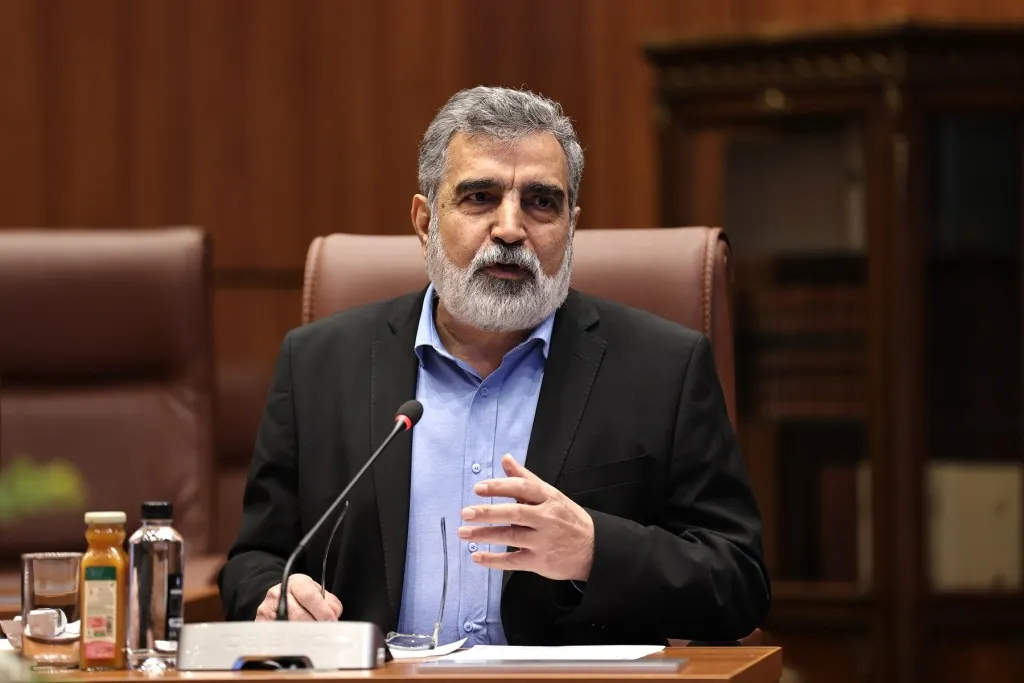
Atomic Energy Organization of Iran spokesman Behrouz Kamalvandi during our tour of the Tehran Nuclear Research Center
At one point during the meeting, Kamalvandi pointed to a young man seated in the back row of the conference room, asked him to stand, and identified him as the son of the Iranian quantum field theorist Massoud Ali-Mohammadi, who was assassinated by a Mossad asset in 2010. Ten years later, Iran lost the godfather of its nuclear program, Mohsen Fakrizadeh, when the Mossad smuggled a machine gun drone into the country and stationed it along a road to attack Fakrizadeh’s convoy. Kamalvandi, for his part, was injured and hospitalized in 2021 while inspecting a part of the Natanz reactor that had been damaged by an Israeli attack.
In the eyes of Iran’s leadership, Witkoff’s demand to end enrichment was not only a recipe for squandering decades of technological advancement, it was an insult to the top tier scientists cut down by Israeli assassins. If this is the new baseline for a deal, negotiations are an exercise in futility. And yet the show goes on.
Economic sabotage behind the guise of negotiations
Since negotiations began, the value of the Iranian rial has fluctuated wildly against the dollar, improving in value after the first round of positive exchanges, then depreciating following each wave of bellicose threats from Trump and his team. I personally witnessed Iran’s financial chaos each time I attempted to exchange dollars for rials, as business owners consulted their phones for the new rate, which seemed to shift from day to day depending on the US president’s rhetoric. A friend joked that I would have paid a substantially lower rate to book a hotel room for my family if negotiations were not currently taking place.
Trump’s statements about the negotiations have also roiled oil markets. On May 16, when Trump claimed he was “getting close to maybe a deal” with Iran, the price of oil plummeted by 3.4%. Then came Witkoff’s call to cease enrichment, and on May 20, US intelligence leaked a warning that Israel was planning to attack Iran’s oil facilities, causing a sudden surge in oil prices.
The American president’s ability to manipulate financial markets both inside and outside Iran with his bluster has contributed to a sense that entering the negotiations have weakened Iran’s political position. Meanwhile, Trump’s crude insults to Iran’s sense of national honor and sovereignty have disrupted whatever goodwill existed when talks began.
The president’s announcement on May 7 that he was considering renaming the Persian Gulf to “the Arabian Gulf” fueled outrage across Iran — uniting everyone from pro-government principlists, to reformists, to pro-regime change monarchists in opposition to the insult to their national pride. Tehran responded with a billboard campaign condemning the change and a lawsuit against Google for abiding by the name change on its Maps applications.

Trump’s speech in Riyadh deepened the enmity, as he attempted to pit the Iranian public against its leadership, praising his unelected, monarchic hosts for supposedly having “turned dry deserts into fertile farmland,” while accusing Iran’s leaders of “turn[ing] green farmland into dry deserts, as their corrupt water mafia…causes droughts and empty riverbeds. They get rich, but they don’t let the people have any of it.”
Two days after Trump’s address in Riyadh, dust storms from the growing deserts of Saudi Arabia gusted into Iran, clouding the skies over Tehran and keeping many residents indoors. The irony did not escape those who heard Trump’s praise for the House of Saud’s supposed green miracle. Meanwhile, there is a growing sense that war clouds are gathering as well.
One well-connected Iranian academic in Tehran told me he expected his country to be on the receiving end of Israeli sabotage and confrontation throughout the summer. Both diplomats I spoke to insisted that in such a scenario, True Promise III was an option on the table.
Reprinted with permission from The Grayzone.
Subscribe and support The Grayzone here. -
Site: LifeNews
U.S. Health and Human Services Secretary Robert F. Kennedy Jr. told the World Health Assembly (WHA) he is calling for a “reboot” of a global health system that will mirror what the Trump administration is implementing through its Make America Healthy Again (MAHA) movement in the US.
In a video message Tuesday to world health ministers gathered in Geneva, Switzerland, Kennedy reviewed the reason President Donald Trump withdrew the US from the World Health Organization (WHO), the health agency of the United Nations (UN), via an executive order on the first day of his new term.
“Like many legacy institutions, the WHO has become mired in bureaucratic bloat, entrenched paradigms, conflicts of interest and international power politics,” Kennedy asserted. “While the United States has provided the lion’s share of the organization’s funding, historically, other countries, such as China have exerted undue influence over its operations in ways that serve their own interests and not particularly the interests of the global public.”
REACH PRO-LIFE PEOPLE WORLDWIDE! Advertise with LifeNews to reach hundreds of thousands of pro-life readers every week. Contact us today.
He also observed that, during the COVID pandemic, the WHO succumbed to pressure from China to suppress reports “of human-to-human transmission” of the virus “and then worked with China to promote the fiction that COVID originated from bats or pangolins rather than from a Chinese government sponsored research at a biolab in Wuhan.”
“Not only has the WHO capitulated to political pressure from China,” Kennedy argued, “it’s also failed to maintain an organization characterized by transparency and fair governance by and for its member states.”
“The WHO often acts like it has forgotten that its members must remain accountable to their own citizens and not to transnational or corporate interests,” he added.
Kennedy continued that, even though he believes most of those who work for the WHO have good intentions, too often “the WHO’s priorities have increasingly reflected the biases and interests of corporate medicine; too often it has allowed political agendas like pushing harmful gender ideology to hijack its core mission; and too often, it has become the tool of politics and turned its back on promoting health and health security.”
Despite the US’ withdrawal from the WHO, President Trump and his administration remain invested in global cooperation on the issue of health, according to Kennedy.
Nevertheless, even with exposure of the corruption behind COVID pandemic policies, the WHO “has doubled down with the pandemic agreement, which will lock in all of the dysfunctions of the WHO pandemic response,” he warned.
“We’re not going to participate in that,” Kennedy asserted. “We need to reboot the whole system, as we are doing in the United States.”
In explaining the Trump HHS’ MAHA agenda, Kennedy said the US will still “focus on infectious disease and pandemic preparedness” but shift its priorities “to focus on chronic diseases, which are prevalent in the United States” and “sickening our people and bankrupting our healthcare system.”
“We’re going to make healthcare in the United States serve the needs of the public, instead of industry profit-taking,” by “removing food dyes and other harmful additives from our food supply,” he said. “We’re investigating the causes of autism and other chronic diseases. We’re seeking to reduce consumption of ultra-processed foods, and we’re going to support lifestyle changes that will bolster the immune systems and transform the health of our people.”
Kennedy said the changes the US is making amount to a “systemic overhaul,” adding that the Trump administration would like to “see a similar reordering of priorities on the global stage, especially considering the fact that through the leadership of the United States and funding from our country, over the past 25 years, millions of global citizens have seen a reduction in premature death due to HIV, TB and malaria.”
The US secretary urged his counterparts in other nations and the WHO “to take our withdrawal from the organization as a wake-up call.”
“It isn’t that President Trump and I have lost interest in international cooperation, not at all,” he said. “We just want it to happen in a way that’s fair and efficient and transparent for all the member states.”
Kennedy also noted the Trump administration has already reached out to other “like-minded countries,” urging others to join them.
“We want a free international health cooperation from the straitjacket of political interference by corrupting influences of the pharmaceutical companies, of adversarial nations and their NGO proxies,” he concluded. “I would like to take this opportunity to invite my fellow health ministers around the world into a new era of cooperation.”
LifeNews Note: Susan Berry writes for CatholicVote, where this column originally appeared.

The post HHS Secretary Robert Kennedy Defends US Leaving WHO appeared first on LifeNews.com.
-
Site: Novus Motus LiturgicusThis is the second installment of a series on the thirteen papal namesakes of our new Holy Father Leo XIV; click these links to read part 1 and part 2. Four Popes named Leo reigned with a span of about 62 years in the 10th century; their reigns are all quite brief, and their careers for the most part so obscure that the precise dates of some of them are not even known, so this will be a short Gregory DiPippohttp://www.blogger.com/profile/13295638279418781125noreply@blogger.com0
-
Site: Zero HedgeOil Prices Dip On Report Of Another Potential OPEC+ Supply BoostTyler Durden Thu, 05/22/2025 - 09:25
OPEC+ is considering a third straight monthly output hike, departing from the norm of stabilizing oil markets. According to Bloomberg, the group of 12 major oil-exporting nations, including Saudi Arabia, UAE, and others, is considering a July increase of 411,000 barrels per day (bpd)—roughly triple the previously planned amount. This would mirror supply increases in May and June. Such an increase in July could lead to a breakdown in Brent crude's $60-per-barrel price floor (as long as the war risk premium remains suppressed).
Brent fell to $63 a barrel, down about 1.7% following the news. West Texas Intermediate dropped to around $60 a barrel.
According to delegates, the increase would mark the third consecutive month of added supply, though they noted that no final agreement had been reached.
Bloomberg provided more color about the strategy at play with OPEC+ that would only increase concerns about a global glut:
The strategy appears aimed at disciplining quota violators by pushing prices lower. But it will add to the overall picture of oversupply -- not only is there a chance of more Iranian barrels hitting the market, energy demand globally looks set to soften.
"We're seeing the market reacting to evidence that OPEC is letting go of a strategy to defend price in favour of market share," said Harry Tchiliguirian at Onyx Capital Group, adding, "It's a bit like taking off a Band-Aid; you do it in one fell swoop."
Department of Energy data released Wednesday morning showed that commercial crude inventories rose for a second consecutive week. Rising inventories and weakness in broader markets have added downward pressure on oil prices.
RBC Capital analyst Helima Croft noted that a 411,000 bpd increase in July is the "most likely outcome," mainly from Saudi Arabia. She said, "A key question will be whether the voluntary cut will be fully drawn down before the leaves turn brown in many parts of the world, in line with the original taper schedule."
OPEC+ is considering another large output increase. However, the macroeconomic backdrop of rising U.S. 10-year Treasury yields may signal a warning: Rising yields reflect tightening financial conditions and slower growth expectations, raising concerns that higher oil supply could weigh on prices. Now, lower prices could be all but derailed if Israel launches a preemptive attack on Iran's nuclear sites with stealth fighters.
-
Site: Ron Paul Institute - Featured Articles
A recent Supreme Court oral argument about the liability of the FBI for invading and terrorizing the wrong home has brought to mind the dark and dangerous history of law enforcement.
The practice of British agents rummaging through the private possessions on the private property of anyone against that person’s will was a significant contributing factor to the American Revolution.
Their most notorious invasion of private property was a subterfuge, perpetrated by the British Parliament, which sought to remind colonists that the king could enter their homes through his agents whenever he wished.
In 1765, Parliament enacted the Stamp Act, which required government stamps — they were actually inked images of government seals, more akin to what is seen when a postage stamp is canceled — on all papers in the possession of the colonists. This included letters, financial and legal documents, newspapers, pamphlets, even posters intended to be nailed to trees. To facilitate the enforcement of the Stamp Act, Parliament enacted the Writs of Assistance Act.
Much like America’s Foreign Intelligence Surveillance Act, the Writs of Assistance Act permitted British agents to obtain search warrants from a secret court for the homes of colonists based on governmental need and without identifying the name or address of the homeowner or even the object sought by the search.
These were general warrants. They were limitless in scope, as they authorized the bearer to search wherever he wished and seize whatever he found. Some students at the College of New Jersey — now called Princeton University — calculated that it cost more for the British government to enforce the Stamp Act than was generated in revenue from the sale of the stamps. We now know that power, not revenue, was the true goal of this dreaded law.
The violent colonial reaction to the enforcement of the Stamp Act led to its repeal by Parliament after just one year. But the Writs of Assistance Act — allowing the London issuance and colonial execution of general warrants — stayed in force until the British left in 1783. And general warrants were not outlawed here until the ratification of the Fourth Amendment in 1791.
The Fourth Amendment was written to protect the quintessentially American right to be left alone. The violation of the right to be left alone usually implicates two fundamental liberties — the right to privacy and the right to own and possess property.
Privacy is a natural right because there are aspects of human existence and personal behavior that are not subject to the government. Natural rights come from our humanity. The natural right to own property has three aspects — the right to use the property, the right to alienate (lease, pledge or sell) it, and the right to exclude whomever the owner wishes — including the government.
As natural rights stem from our humanity, they may only be violated when we give them up or waive them by our violation of someone else’s natural rights. When James Madison wrote the Fourth Amendment, he rejected the waiver standard and instead chose the easier-for-the-government probable cause standard as the sole element justifying a government invasion of property rights.
Today, to get physically — or even digitally — onto your property in defiance of your will, the government theoretically must meet Madison’s probable cause standard.
That standard requires a showing to a neutral judge that it is more likely than not that a crime has been committed and that it is more likely than not that evidence of that same crime can be found in the place to be searched or the person or thing to be seized. These standards come directly from the language of the amendment itself.
Does the probable cause standard adequately protect property rights? It does not; just ask the folks whose home the FBI destroyed.
The probable cause standard involves a weighing and balancing test pitting the nature of property ownership against the government’s claimed need for evidence. It weighs the harm to property rights caused by a government invasion as against the harm to the government by denying it the fruits of its planned invasion.
But the very concept of weighing a natural right against a government need is totalitarian. The government needs whatever it wants, whereas our rights are inalienable unless we waive them. A natural human right always supersedes a government wish. Thus, the only standard that morally justifies a government invasion of private property is waiver by the violation of another’s natural rights.
For example, if a bank robber runs into his house with stolen loot, he has waived his property rights in the house until he has been arrested and the loot retrieved, as he has violated the natural rights of the depositors in the bank and the bank’s right to exclude him from its property. If the government cannot demonstrate waiver by a violation of another’s natural right, then the property owner — even if he is the sought-after bank robber — can morally exclude the government from his property.
Because privacy and property ownership are inalienable rights and the government is an artificial creation based on a monopoly of force, when the government wants to enter upon private property against the will of the owner, and it seeks a warrant from a judge, the owner’s natural rights and the government’s needs can never be in equipoise.
Even when the government seeks to demonstrate waiver, the government should be presumed to be wrong, and every inference and bias should be drawn against it because the essence of government is the negation of liberty. We were born with natural rights. The government’s only source of wealth and power is what it has been taken from us.
Regrettably, none of this is the law today as the Constitution is a demonstrable failure. Today we are back to search wherever you wish and seize whatever you find.
To learn more about Judge Andrew Napolitano, visit https://JudgeNap.com.
COPYRIGHT 2025 ANDREW P. NAPOLITANO
DISTRIBUTED BY CREATORS.COM -
Site: Zero HedgeDeath Of The Dollar: An Eternal TaleTyler Durden Thu, 05/22/2025 - 09:05
Authored by Michael Lebowitz via RealInvestmentAdvice.com,
The following paragraph, courtesy of Amazon, reviews the book Death of the Dollar by William Rickenbacker.
Death of the Dollar by William F. Rickenbacker is a critical examination of the economic policies and monetary mismanagement that the author argues are eroding the value of the U.S. dollar and threatening financial stability. Rickenbacker contends that the actions of money managers, including excessive government spending, inflationary policies, and the detachment of the dollar from the gold standard, are systematically devaluing the currency. The book warns of an impending monetary disaster, highlighting how these policies disproportionately harm everyday citizens who rely on the dollar’s stability for savings and investments. Through a blend of economic analysis and historical context, Rickenbacker underscores the dangers of unchecked financial intervention and the potential for a collapse of the dollar’s purchasing power.
Plenty of books, articles, and social media posts herald the same grim forecast as Rickenbacker. For the most part, they rely on similar reasoning. Essentially, lax monetary policy and gross fiscal spending, both deemed to be inflationary, will result in dollar devaluation and ultimately the death of the dollar.
The difference between Rickenbacker’s book and other dollar demise forecasts is that Death of the Dollar was written in 1968! Fifty-seven years later, despite, or possibly because of Rickenbacker’s justifications, the dollar is still the world’s reserve currency, and no other sovereign currency, cryptocurrency, or precious metal will replace it anytime soon.
Given the topic’s importance and the gross misinformation spread about the dollar’s imminent demise, we review Rickenbacker’s thesis to highlight that today’s warnings have been around for decades and why the odds of them coming to fruition this time are very low, as they were decades ago.
Removal Of The Gold Standard
Rickenbacker’s book was published in 1968, three years before President Nixon closed the gold window, essentially making the dollar a fiat currency. While his book accurately predicted that ground-shaking event, it did not correctly anticipate its impact.
He reasoned that without gold regulating the supply of dollars, unchecked monetary policy would result in reckless “money printing.”
He was correct that the Fed would have more flexibility in managing the money supply. Furthermore, with this added power, we have seen reckless behavior, as he theorized. However, Rickenbacker erred on the money printing allegation.
The Fed doesn’t print money. All money is lent into creation by banks. The Fed prints bank reserves, which allow banks to make loans, i.e., print money, if they choose. More importantly, even if the money supply increases due to Fed incentives to lend, it’s unclear whether such activity is good or bad for the economy and how it impacts inflation and ultimately the dollar’s value. That is a function of the productivity of debt.
Simply, productive debt drives economic growth, increases the nation’s prosperity, and reduces deficits as a percentage of economic activity. Unproductive debt detracts from economic growth and prosperity and worsens deficits. Weaker growth from unproductive debt tends to be disinflationary.
As judged by an increasing debt-to-GDP ratio, aggregate debt has been unproductive, leading to lower inflation growth rates. Thus, if the concern is that “money printing” would lead to inflation, it may lead to disinflation.
Fed Flexibility
In one respect, Rickenbacker correctly said that giving the Fed more flexibility was a curse. Easy money policy has led to periods of gross speculation and crises, such as in 2008.
However, without the gold shackles, the Fed has incredible power to manage economic crises and avoid a currency collapse. In fact, despite the 2008 crisis having roots in the US mortgage market and the prospect of the collapse of the US banking system, the world flocked to dollars during the crisis, as shown below.
Most crises have been accompanied by a stronger dollar, proving that the dollar is the port in the storm foreign investors seek when economic confidence is lacking, and liquidity is paramount.
Excessive Government Spending
The book criticizes massive federal expenditures, particularly on social programs and military efforts, which create budget deficits, drive up inflation, and ultimately devalue the dollar. The book was written while Lyndon Johnson spent heavily on the Vietnam War and domestic programs. Again, Rickenbacker was correct in worrying about inflation, a big problem throughout the 1970s.
Despite ever-increasing government spending and an increasing debt-to-GDP ratio, the globalization of trade has expanded rapidly since his book was published. With it, foreigners’ demand for dollars has been growing, and in mirror fashion, so is their need to invest the dollars, which helps us fund our deficits.
Even today, with “runaway” deficits making headlines daily, the dollar remains in the upper range of the last 35 years.
Dollar Devaluation In Context
Rickenbacker believed that easy money Federal Reserve policies, such as low interest rates and expanding the money supply, would fuel inflation that would erode the dollar’s purchasing power. He was right, as evidenced by comparing what a dollar buys today versus yesteryear. However, the argument provides little context.
For instance, in the 1950s, a hamburger (15 cents), fries (10 cents), and a Coke (10 cents) at McDonald’s cost less than 50 cents. Today, the same meal could run nearly $10.
Although decades of inflation have drastically eroded the dollar’s value, our standard of living has risen appreciably. To wit, the purchasing power of one dollar in 1947 has eroded to 7 cents. However, as shown below, inflation-adjusted incomes have risen fivefold since 1947. The dollar buys less, but our incomes buy more!
Trade and Balance of Payments Deficits
Rickenbacker points to persistent U.S. trade deficits and dollar outflows abroad, which weaken the currency’s global standing. He is correct that trade deficits have steadily increased, resulting in more dollars flowing abroad. However, more dollar outflows are a result of more demand for dollars. Furthermore, those dollars ultimately return to the US through investments and loans to the government and corporations. The larger the global economy, the greater the need for dollars, and the more dollars that need to be invested in the US economy.
Rickenbacker Was Right
The author’s concerns are valid and, in many cases, have proven true. However, the victim has not been the dollar. The victims are larger deficits, lower productivity growth, hollowing out of manufacturing, and a growing wealth divide, to name a few.
While these are big problems, they do not necessarily threaten the dollar’s status. As we wrote in Four Reasons The Dollar Is Here To Stay:
The pundits will be right someday. The dollar’s death as the reserve currency will come, and some other nation’s currency, cryptocurrency, gold, shells, or something else will take its place. However, that day is not coming anytime soon. The four reasons we describe in the article leave the world with no alternative.
While China is rapidly growing its economy and global trade footprint, it lacks the rule of law and liquid capital markets to sustain a global currency. It’s difficult to see how a communist country can overcome those challenges.
The Euro is the most viable competitor. They have the rule of law, but their capital markets are not nearly liquid enough to facilitate global trade. They also lack the military might to force the usage of the Euro. Let us also remember its finances are in equally bad or even worse shape than the U.S. There is no reason to suspect the euro could overtake the dollar.
Bitcoin? Forget about it! The government will never relinquish its control over the currency because, with that, they lose control of the nation.
Summary
Had Rickenbacker’s Death of the Dollar book solely focused on monetary and fiscal imprudence and its negative implications for the country, he would have been proven a seer. Unfortunately, he was wrong to insist that the dollar would lose its status as the world’s reserve currency.
The graph below, courtesy of the Federal Reserve, shows how the dollar’s usage in global transactions has been stable for the last two decades.
The index calculation, as detailed at the bottom of the graphic, is based on the primary uses of currencies.
-
Site: Mises InstituteGovernment protection and deposit insurance slows the inevitable—until it doesn’t.
-
Site: AsiaNews.itIn his first visit to Lebanon since 2017, the Palestinian president is committed to disarmament, although without setting a timetable. This complex process is seen in Beirut as a prerequisite for the total end of Hezbollah's armed struggle. The joint statement with President Aoun includes an 'implicit' recognition of Israel's right to exist.
-
Site: Zero HedgeDOGE Damage Deepens As 'Deep TriState' Continuing Jobless Claims Highest Since Dec 2021Tyler Durden Thu, 05/22/2025 - 08:51
The number of Americans filing for jobless benefits for the first time fell modestly last week to 227k (below expectations) and is basically unchanged since December 2021...
...despite the public sentiment panic by CEOs, layoffs refuse to rise (is all that whining just signaling how much virtue they have, or is it like UMich, damaged by TDS in their imaginations, but not enough to impact the real world)...
Continuing jobless claims pushed back above the critical 1.9 million Americans level once again...
...as while the private sector CEOs seem to refuse to budge (despite their misery), the 'Deep Tristate' is seeing continuing jobless claims surge to the highest since December 2021...
DOGE is working!!
-
Site: Zero HedgeFutures, Treasuries Slide After "Big, Beautiful Bill" PassesTyler Durden Thu, 05/22/2025 - 08:41
US stocks and treasuries sold off after President Trump’s signature tax bill passed the House by the narrowest of margins (214-215), sparking fears that the surging deficit - already at a nosebleed 6.5% of GDP - necessary to fund the bill will spark even higher rates at a time when foreign buyers are boycotting US Treasury purchases. As of 8:00am, S&P futures slumped by 0.5%, trading near session lows and reversing an earlier gain of about 0.3%. Nasdaq futures dropped 0.4%. Treasuries also slumped, extending days of losses in which the 30-year yield hit the highest since 2023: the 10Y was trading at session highs of 4.62%. The dollar ended a three-day losing run while Bitcoin pushed further into record territory. Commodities are weaker across all 3 complexes: oil slumped again after BBG reported that OPEC+ is considering another production hike at the June 1 meeting. SCMP reports that Mexico pledges neutrality between US/China in the Trade War; this follows a similar announcement from Indonesia last month. Today’s macro data focus is on Flash PMIs, weekly claims, existing home sales, and regional Fed activity indicators.
In premarket trading, Mag 7 stocks were mixed (Alphabet +1.2%, Nvidia +0.5%, Amazon +0.5%, Tesla -0.2%, Meta Platforms +0.3%, Microsoft +0.02%, Apple -0.1%). Solar stocks sink as US House Republicans’ new version of the tax and spending bill accelerates the end of incentives for clean electricity production (Sunrun -34%, Array Technologies -14%, First Solar -6%). Crypto-linked stocks gained in premarket trading after Bitcoin hit an all-time high. The world’s largest cryptocurrency reached a record price of $111,878 on Thursday amid growing optimism around the US stablecoin bill (Galaxy Digital (GLXY) +5%, Riot Platforms (RIOT) +3%, Mara Holdings (MARA) +3%). Here are some other notable premarket movers:
- Advance Auto Parts (AAP) soars 30% after the retailer of aftermarket auto components reaffirmed its comparable sales forecast for the full year.
- Analog Devices (ADI) rises 2% after the chipmaker reported adjusted earnings per share for the second quarter that beat the average analyst estimate.
- Delcath Systems (DCTH) rises 2% after the specialty pharmaceutical and medical devices company issued full year 2025 guidance and announced a plan to enter into a National Medicaid Drug Rebate Agreement to expand patient access.
- Nike (NKE) shares rose in premarket trading as the company returns to Amazon.com’s online store after leaving it in 2019.
- Humana (HUM) falls 5% and UnitedHealth Group (UNH) slips 2% after the Centers for Medicare & Medicaid Services said it will embark on a “significant expansion” of its auditing efforts for Medicare Advantage plans.
- LiveRamp (RAMP) climbs 10% after the marketing technology company reported fourth-quarter results that beat expectations.
- Lumen Technologies (LUMN) advances 12% after AT&T agreed to buy the company’s consumer fiber operations for $5.75 billion, expanding its fast broadband service in major cities like Denver and Las Vegas.
- Manchester United (MANU) drops 5% after the English football club lost the high-stakes Europa League final to Tottenham Hotspur in Bilbao, Spain last night.
- Navitas Semiconductor (NVTS) surges 175% after the semiconductor company said Nvidia picked it to collaborate on data center power infrastructure.
- Sable Offshore Corp. (SOC) falls 4% after the oil and gas company priced its stock offering.
- Snowflake (SNOW) gains 9% after the software developer forecast product revenue for the second quarter above the average analyst estimate.
- Urban Outfitters (URBN) rises 18% after the apparel retailer reported net sales for the first quarter that beat the average analyst estimate.
Just before 7am ET, after an all night session in the House, US lawmakers passed Trump's "big, beautiful bill", a sprawling multi-trillion dollar package that would avert a year-end tax increase at the expense of adding to the US debt burden. The move comes after a downgrade by Moody’s Ratings thrust concerns over the ballooning deficit into the spotlight. This has shown up in Treasuries, sapping sentiment after an equity rebound put the S&P 500 on the cusp of a bull market. Goldman calculated the yield at which stocks would crack: the bank notes that on May 1st, 10yr yield was 4.12%...we just touched 4.6% yesterday after the weak 20yr auction. At what level do yields start to put real pressure on the stock market? The easy big round number is 10yr @ 5%. The more nuanced answer is >4.7% (before the end of May) as velocity of move in rates matters much more than absolute levels (in regards to impacting stocks). When 10yr yield has moved higher by 2SD (60bps) within a one month period the stock market comes under pressure.
“Bond vigilantes are back,” Beata Manthey, a strategist at Citigroup Inc., told Bloomberg TV. “The market is worried about debt sustainability. It’s not very helpful, given how strong a rebound we’ve been seeing in equity markets.”
Later on Thursday, S&P Global will issue its preliminary May survey of manufacturing and service providers. Based on economists’ projections, industrial weakness probably continued while growth in services activity may have picked up slightly. Weekly jobless claims data is also due.
Meanwhile, the doom and gloom from Jamie Dimon continued, after the JPMorgan CEO said he can’t rule out the US economy will fall into stagflation as the country faces huge risks from both geopolitics, deficits and price pressures. “I don’t agree that we’re in a sweet spot,” Dimon told Bloomberg TV in Shanghai.
With everything else being sold, traders turned to non-fiat alternatives: Bitcoin surpassed $111,000 for the first time with traders increasingly bullish on the prospects of the cryptocurrency., gold traded back over $3,300.
“Bitcoin, and the crypto market in general, have largely decoupled from equities over the last few days,” said Richard Galvin, co-founder of hedge fund DACM. “Bitcoin continues to benefit from its market position as a non-system, store of value.”
European stocks fall as worries over rising bond yields curbed investor appetite for risky assets. The Estoxx index slumped 1%, with the yield-sensitive technology sector is among the biggest laggards. Among individual stocks, EasyJet Plc falls after the low-cost airline reported bigger-than-expected losses, while Johnson Matthey rises on a major sale of its technology business. Here are some of the biggest movers:
- Johnson Matthey shares jump as much as 34%, the most in over three years, after the company announced the sale of its catalyst technology business at an enterprise value of £1.8 billion, with the bulk of proceeds to be returned to shareholders.
- Mitchells & Butlers gains as much as 2.2% after the pub and restaurant operator delivers what analysts view as a strong update, with full-year operating profit expected to be at the top end of current consensus.
- Grenergy Renovables gains as much as 8%, hitting a new record high. RBC Capital says the Spanish renewables company has achieved strong growth in the first quarter, supported by gains of the Atacama storage project.
- Gimv gains as much as 8.9%, the most since March 2020, after the investment company posts what KBC Securities describes as another record year
- Stora Enso gains as much as 7% to its highest since March 20 after the Finnish forest and paper company said it will divest around 175,000 hectares of forest land in Sweden for a total value of €900 million.
- EasyJet shares fall as much as 6.1% after the travel firm reported a loss in the first half.
- BT shares drop as much as 5.3% after the telecom company reported a decline of 243,000 Openreach broadband lines in the quarter ended March, a sign of heightened competition among UK’s fiber builders.
- British Land shares drop as much as 7.1% in their worst one-day loss in two years, after the UK property firm’s unchanged guidance and forecast for flat 2026 earnings per share tempered a recent rally in the stock.
- Freenet shares sink as much as 16%, the most since May 2022, after the mobile communications service provider reported Ebitda for the first quarter that missed estimates.
- Elior drops as much as 5.3% following a mixed first-half report from the commercial catering company.
- Intertek shares drop as much as 3% after the inspection services provider reported disappointing organic growth for the first four months of the year.
- MPC Container Ships falls as much as 17%, the most since 2021, after the Norwegian shipping firm presented its latest earnings and a new dividend policy.
Asian equities dropped the most in two weeks, driven by losses in technology stocks after Treasury yields jumped overnight on concerns about the US budget deficit. The MSCI Asia Pacific Index fell as much as 0.8%, the biggest decline since May 8, with Alibaba, TSMC and Samsung contributing the most to the losses. South Korea’s Kospi retreated over 1%, while benchmark gauges in Hong Kong, Japan and India also lost ground. Philippine stocks weakened after President Ferdinand Marcos Jr. ordered his cabinet to resign.
In FX, the Bloomberg Dollar Spot Index rebounded to rise 0.1% after three straight days of losses. EUR/USD fell 0.2% to 1.131 after data showed private-sector activity in the euro area unexpectedly shrank in May. USD/JPY slumped as much as 0.6% to 142.81, the lowest level in two weeks, before paring the move to trade 0.2% lower. Despite the latest drop, the Hang Seng China Enterprises Index remains on track to cap a sixth straight week of gains. JPMorgan Chase is committed to long-term investment in China, despite tensions with the US, Chief Executive Officer Jamie Dimon said in a Bloomberg TV interview.
In rates, the yield for 10-year Treasuries advanced two basis points to 4.62% on Thursday. The worry in debt markets is that the tax bill would add trillions of dollars to an already bulging deficit at a time when investors’ appetite is US assets is slumping. The 30-year yield reaching new multimonth highs of 5.15% while short-end tenors richen, pivoting around a little-changed 7-year sector. 5s30s spread near 97bp is widest since May 1. European sovereign curves are also steeper. The Treasury will sell $18 billion of 10-year TIPS in a reopening at 1pm New York; Wednesday’s 20-year new-issue auction tailed by about 1bp, spurring long-end yields higher. Focal points include House Republicans narrowly passing President Trump’s tax bill shortly before 7am, PMI and jobless claims data, a 10-year TIPS auction and comments by NY Fed President Williams.
Looking at today's calendar, US economic data includes April Chicago Fed national activity index and weekly jobless claims (8:30am), May preliminary S&P Global US PMIs (9:45am), April existing home sales (10am) and May Kansas City Fed manufacturing activity (11am). Fed speaker slate includes Richmond Fed President Barkin (8am) and Williams (2pm).
Market Snapshot
- S&P 500 mini -0.5%
- Nasdaq 100 mini -0.4%,
- Stoxx Europe 600 -1%
- DAX -0.8%, CAC 40 -1%
- 10-year Treasury yield -2 basis points at 4.58%
- VIX -0.4 points at 20.49
- Bloomberg Dollar Index +0.1% at 1220.46
- euro -0.3% at $1.1297
- WTI crude -1.5% at $60.66/barrel
Top Overnight News
- A man fatally shot two Israeli Embassy staff members late Wednesday near a Jewish museum in downtown Washington. WSJ
- Scott Bessent and his Japanese counterpart Katsunobu Kato confirmed existing currency views and didn’t discuss FX levels when they met in Canada. BBG
- On a call Monday, President Trump told European leaders that Russian President Vladimir Putin isn’t ready to end the Ukraine war because he thinks he is winning. This runs counter to what Trump has often said publicly, that he believes Putin genuinely wants peace. WSJ
- BOJ board member Asahi Noguchi said on Thursday he saw no need for the central bank to intervene in the bond market to stem recent sharp rises in super-long yields, describing the moves as "rapid but not abnormal." Noguchi also said the central bank must pause its interest rate hikes for the time being until there is more clarity on the impact of U.S. tariffs on the economy. RTRS
- Israel is making preparations to “swiftly” strike Iran’s nuclear facilities if talks between Washington and Tehran collapse without a deal. Axios
- OPEC+ members are discussing whether to agree on another super-sized production increase at their meeting June 1, delegates said. That would be the third straight month of adding more barrels to the market. Oil declined. BBG
- Eurozone flash PMIs for May were mixed, with modest upside on manufacturing (49.4, up from 49 in Apr and above the Street’s 49.2 forecast) and slight downside on services (48.9, down from 50.1 in Apr and below the Street’s 50.5 forecast), while inflation in aggregate cooled (driven by manufacturing). S&P
- US/EU trade talks – Brussels is offering to extend an existing shellfish trade deal w/the US that expires on 7/31 as an inducement to striking a broader agreement around tariffs. FT
- Lutnick says he predicts a slew of trade deals by the middle of the summer and doesn’t anticipate tariffs fueling higher prices in the US. Axios
- BofA Institute Total Card Spending (Week to 17th May) -0.7% (vs +1.0% average in April)
- US President Trump posted "I am giving very serious consideration to bringing Fannie Mae and Freddie Mac public. I will be speaking with Treasury Secretary Scott Bessent, Secretary of Commerce Howard Lutnick, and the Director of the Federal Housing Finance Agency, William Pulte, among others, and will be making a decision in the near future."
Trade/Tariffs
- EU is open to extending lobster deal as part of a package to remove tariffs imposed by US President Trump, according to FT.
- South African President Ramaphosa said following a meeting with US President Trump that they had discussions on trade and there will continue to be engagement on tariffs. It was also reported that South Africa's Trade Minister said they submitted a proposal regarding a framework agreement with the US and had some US feedback, while they then resubmitted a revised document with the proposal about a trade agreement.
- Canada's Minister of International Trade and Intergovernmental Affairs LeBlanc is to visit Washington DC to meet with Trump admin officials, while it was also reported that Canada's Finance Minister Champagne said he will discuss Canada's role as the largest customer for US exports in meeting with US Treasury Secretary Bessent.
- Japanese Finance Minister Kato said he told Bessent that US tariffs are regrettable and stated tariffs are not an appropriate means to correct macroeconomic imbalances that are behind trade imbalances, while Kato noted that he did not directly discuss Japan's US Treasury holdings in the meeting with Bessent.
- US Treasury Secretary Bessent and Japanese Finance Minister Kato discussed global security and bilateral trade and currency issues on the sidelines of the G7, while they reaffirmed shared belief that exchange rates should be market-determined and reaffirmed USD/JPY exchange rate currently reflects fundamentals.
A more detailed look at global markets courtesy of Newsquawk
APAC stocks were on the back foot following the sell-off on Wall St where stocks, treasuries and the dollar were pressured amid deficit concerns and a weak 20-year auction. ASX 200 retreated with energy and tech front-running the declines, although continued strength in gold producers atoned for some of the losses. Nikkei 225 gapped beneath the 37,000 level amid a firmer currency and proceeded in a somewhat choppy fashion as participants also digested data releases, including a surprise surge in Japanese Machinery Orders and mixed PMI figures. Hang Seng and Shanghai Comp conformed to the downbeat sentiment in the absence of any fresh bullish catalysts and after recent earnings results failed to inspire, while the mainland initially showed resilience in early trade before succumbing to the broad risk-off mood.
Top Asian News
- PBoC to sell CNY 500bln of one year medium term lending facility loans on Friday.
- RBA's Hauser, on recent trip to China, says found confidence Beijing would do what was needed to sustain growth; Australian exporters upbeat about resilience of China demand Found striking confidence that China going into trade war with strong hand. China organisations expected large share of economic costs of tariffs would fall on US. China contacts expressed a determination not to cushion those costs. Found little expectation that yuan would be devalued to insulate US from tariffs. Possible could see more intense competition at home from Chinese firms discounting. Unclear how big an impact given limited overlap between Chinese and Australian output.
- BoJ's Noguchi says they do not look at the size of JGB buying from the standpoint of monetary policy. In tapering, market predictability and flexibility is the most important. Does not think it is appropriate to recklessly intervene to correct bond yield moves. Should not move on rates when there is a lack of clarity on economic outlook.
- Japanese Economy Minister Akazawa held unofficial phone talks with US Treasury Secretary Bessent before Wednesday, according to TV Tokyo; Bessent reportedly expressed reluctance to meet Akazawa this week; the two will meet next week instead.
- China's MOFCOM says China firmly opposes US export controls on Chinese AI chips.
European bourses (STOXX 600 -0.7%) opened lower across the board, in a continuation of the pressure seen on Wall St/APAC trade and have traded at subdued levels throughout the morning. European sectors hold a strong negative bias, with only Basic Resources and Chemicals marginally holding in positive territory. Consumer Products is underperforming after LVMH’s (-1.5%) cautious comments on the Luxury sector. Chemicals names are faring better vs peers, with Bayer (+1.7%) doing much of the heavy lifting. The Co. benefits from a WSJ report which suggests the US HHS Secretary's move will “go easier than expected on pesticides in farming”.
Top European News
- ECB's Nagel sees progress on the US tariff dispute but more hurdles to overcome and noted the US was showing a better understanding of Europe's point of view, while he is a little more confident than perhaps was a few days ago. Nagel stated that German economic growth in Q1 could surprise on the upside but will get worse in Q2 and could see 1% plus growth in 2026.
- ECB's Vujcic says "Euro area growth is positive but low; inflation is slowly converging to 2% target; expect to get close to 2% target at end-2025" Expect to reach 2% target in early 2026.
- IMF forecasts French growth of 0.6% in 2025 and 1% in 2026; says France needs fiscal effort of 1.1% of GDP in 2026, followed by an average of about 0.9% over the medium term; Says France needs credible and well-designed package of measures to rein in deficit over time.
- EU Parliament backs very high tariffs on nitrogen-based fertilisers and farm produce from Russia and Belarus.
Eurozone PMIs
- EU HCOB Composite Flash PMI (May) 49.5 vs. Exp. 50.7 (Prev. 50.4); HCOB Services Flash PMI (May) 48.9 vs. Exp. 50.3 (Prev. 50.1); HCOB Manufacturing Flash PMI (May) 49.4 vs. Exp. 49.3 (Prev. 49.0)
- French HCOB Composite Flash PMI (May) 48.0 vs. Exp. 48.0 (Prev. 47.8); HCOB Services Flash PMI (May) 47.4 vs. Exp. 47.5 (Prev. 47.3); HCOB Manufacturing Flash PMI (May) 49.5 vs. Exp. 48.9 (Prev. 48.7)
- German HCOB Composite Flash PMI (May) 48.6 vs. Exp. 50.4 (Prev. 50.1); HCOB Services Flash PMI (May) 47.2 vs. Exp. 49.5 (Prev. 49.0); HCOB Manufacturing Flash PMI (May) 48.8 vs. Exp. 48.9 (Prev. 48.4)
- UK Flash Composite PMI (May) 49.4 vs. Exp. 49.3 (Prev. 48.5); Flash Services PMI (May) 50.2 vs. Exp. 50.0 (Prev. 49.0); Flash Manufacturing PMI (May) 45.1 vs. Exp. 46.0 (Prev. 45.4)
FX
- USD is currently relatively steady and mixed vs. peers following three consecutive sessions of losses. With trade updates lacking, focus is currently on the fiscal front as markets await the outcome of the House vote on President Trump's tax bill. If the bill passes this hurdle, attention from an FX perspective will be on how back-end US rates react to the price tag and impact on the deficit. This week's data highlights are presented today via weekly claims and flash PMI metrics. The latter will likely carry greater sway as markets look for evidence on how the trade war is impacting US business. Fed speaker's today include Williams and Barkin.
- The rally in the EUR has paused for breath. This morning's macro focus has been on EZ PMI metrics which have painted a picture of a stabilising manufacturing sector but a slowdown in the services industry. The trade war is clearly acting as a cloud over the Eurozone economy; note, yesterday Bloomberg reported that the EU is preparing a trade proposal for the US to steer momentum into talks. Today's docket sees the ECB's account of the April meeting. Currently trading around the 1.13 mark.
- JPY is top of the G10 leaderboard alongside the soft risk sentiment and as markets digest comments from Japanese Finance Minister Kato and BoJ board member Noguchi. On the former, Kato noted that he agreed with US Treasury Secretary Bessent that FX rates should be set by markets and they did not directly discuss Japan's US Treasury holdings. Elsewhere, BoJ's Noguchi, in response to recent moves in Japanese yields, said that he does not think it is appropriate to recklessly intervene to correct bond yield moves.
- GBP is a touch firmer vs. the USD and extending its winning run for a fourth consecutive session. The latest round of PMI metrics from the UK saw the services component beat expectations and return to expansionary territory, manufacturing missed but ultimately, the composite rose and just about beat the consensus. Looking ahead, today's speaker slate sees a trio of MPC members with Breeden, Dhingra & Pill all due on deck. Cable is currently contained within Wednesday's 1.3380-1.3468 range.
- Mildly diverging fortunes for the Antipodes with AUD outperforming NZD as the AUD/NZD cross looks to close the post-RBA gap lower. Incremental newsflow for both has been lacking as the New Zealand Budget and forecasts garnered little fanfare and comments from RBA's Hauser proved to be non-incremental.
Fixed Income
- USTs are a little firmer, attempting to recover following the hefty losses seen in the prior session following a weak US 20yr auction. Focus firmly is on the fiscal front. Overnight, the House Rules Committee passed President Trump’s tax/spending bill. Thereafter, the broader floor voted to open debate on the tax bill, a debate process that lasts for around two hours (started approx. 08:00BST) and is followed by a vote on the bill. Progress on the bill is bearish for USTs as it will increase the US’ debt level, a figure which has been increasing and was the driver behind the Moody’s downgrade last week. USTs currently trading around 109-19.
- Bunds started the day in the red but currently at the upper-end of a 129.49-91 band. Bunds have been gradually making their way off lows throughout the morning, edging higher slowly into the day’s data points which have featured generally weak Flash PMIs, with the expectation of Manufacturing where tariff-mitigation measures appear to have provided some support. No real reaction to the German Ifo figures at the same time. Ahead, ECB Minutes though as usual these will be deemed stale; focus will be on ECB's de Guindos, Elderson and Escriva throughout the day.
- Gilts are softer, trading slightly weaker than EGBs throughout the morning as has been the case at several points over the last few weeks but with today’s underperformance likely a function of Gilts reacting to Wednesday’s US auction and borrowing data this morning. PSNB data this morning came in well above expectations and the prior, though that was subject to a downward revision, in another unwelcome series for Chancellor Reeves after the hotter-than-expected inflation print earlier this week. Given all this, Gilts opened lower by 18 ticks and then slipped another 13 to a 90.29 trough in short order.
- Swedish Debt Office sees the 2025 deficit at SEK 93bln (Nov. forecast 65bln), nominal bond volume SEK 118bln (Nov. forecast 100bln); "new plan also contains an additional foreign currency bond for this year".
- Spain sells EUR 6.2bln vs exp. EUR 5.5-6.5bln 5.15% 2028, 3.10% 2031 & 1.00% 2042 Bonds.
- France sells EUR 12.497bln vs exp. EUR 10.5-12.5bln 2.40% 2028, 2.70% 2031, 0.00% 2032 OATs.
Commodities
- Crude futures were pressured overnight by the downbeat mood across markets and following bearish inventory data. Renewed pressure was seen during the European morning amid source reports that OPEC+ members are reportedly discussing whether to agree to another output hike of 411k BPD in July, via Bloomberg citing sources, although no agreement has been reached yet. WTI resides in a USD 60.37-61.75/bbl range while its Brent counterpart trades in a USD 63.67-65.03/bbl parameter.
- Overall, there is mixed trade across precious metals with hefty underperformance in spot palladium as it tracks the downbeat sentiment across the auto sector. Spot gold trades flat now and currently resides in a current USD 3,311.08-3,345.47/oz range.
- Base metals are mostly lower amid the broader downbeat risk profile, whilst Flash PMIs from Europe this morning were mixed but the commentary was mostly downbeat. 3M LME copper resides closer to the bottom end of a USD 9,495.65-9,579.20/t range at the time of writing.
- UK urged lowering price cap on Russian oil at the G7 meeting, according to Bloomberg.
- OPEC+ members are reportedly discussing on whether to agree to another output hike of 411k BPD in July, via Bloomberg citing sources; one of the options being discussed, no agreement has been reached yet.
Geopolitics: Middle East
- Iranian Foreign Minister says "We have a better understanding in many areas, but in some, especially enrichment, differences still remain. I think we cannot reach an agreement until this issue is resolved.", via Iran Nuances
- Israel is preparing to carry out a swift attack on Iran's nuclear facilities if nuclear talks between the US and Iran fail, via Walla citing sources.
- Israeli military said it identified and intercepted a missile launched from Yemen towards Israel.
- Two Israeli embassy employees were killed in a shooting near a Jewish museum in Washington DC, while the Washington DC police chief announced the suspect was detained by event security and had chanted "Free Palestine" while in custody.
Geopolitics: Ukraine
- Moscow Mayor says Russian has downed two drones en route to Moscow
- US President Trump told European leaders in private that Russian President Putin isn't ready to end the war, according to WSJ.
Geopolitics: Other
- North Korea said it will convene the ruling party central committee meeting in late June and North Korean leader Kim watched the launch of a 5000-ton destroyer, while an accident occurred during the launch of the North Korean warship. Furthermore, Kim said the accident was unacceptable and was the result of negligence and irresponsibility.
- Indian PM Modi says Pakistan will not get water, to which India has a right.
US Event Calendar
- 8:30 am: Apr Chicago Fed Nat Activity Index, est. -0.25, prior -0.03
- 8:30 am: May 17 Initial Jobless Claims, est. 230k, prior 229k
- 8:30 am: May 10 Continuing Claims, est. 1881.62k, prior 1881k
- 9:45 am: May P S&P Global U.S. Manufacturing PMI, est. 49.85, prior 50.2
- 9:45 am: May P S&P Global U.S. Services PMI, est. 51, prior 50.8
- 9:45 am: May P S&P Global U.S. Composite PMI, est. 50.3, prior 50.6
- 10:00 am: Apr Existing Home Sales, est. 4.1m, prior 4.02m
- 10:00 am: Apr Existing Home Sales MoM, est. 1.99%, prior -5.9%
DB's Jim Reid concludes the overnight wrap
Morning from Holland where I’ve just been told I’m now a BA Gold Card holder for life after my latest trip tipped me over the landmark. Annoyingly in my first 10 plus years of my career I didn’t collect tier points as I couldn’t be bothered to fill in the forms. So what could have been. I’ll make sure that on my way back home today I’ll have a celebratory decaf latte in the lounge.
If you collected air miles for issuing government debt then many DM countries would have been in the first class lounge many years ago and over the last 24 hours concerns have continued to mount about debt sustainability. We should put it into some perspective as sensible people have been worried about debt sustainability for years. Indeed if you'd have told anyone 10-20 years ago that the US could comfortably fund 7% mid-cycle deficits in recent years then most would have been incredulous at the prospect. So we could have sustainability fears for years to come before an inevitable accident or event happens. However it's fair to say that events in 2025 have brought forward any day of reckoning.
Yesterday saw the 30yr Treasury yield (+12.3bps to 5.09%) close above 5% for the first time since October 2023, and only 2bps away from its highest level since 2007. Even during the inflation peak at 9.1% in 2022, 30 year US yields didn't climb above 4.40% that year. The only time they've been briefly above 5% since 2007 was at the peak of the Treasury sell off in autumn 2023, when yields rose by over 100bps in under three months following an increase in the supply of long-dated bonds and delay of Fed rate cut expectations. It took a change in issuance duration from the Treasury to calm the long-end.
While Treasury yields were already trading around 5bps higher midway through yesterday’s session, they took another major step higher after a soft 20yr auction, which saw $16bn of bonds issued at 5.05%, +1.2bps above the pre-sale yield. This ended a pattern seen in the previous two sessions of an early Treasury sell-off reversing during US trading hours. Real yields led the move higher, with 30yr real yields rising +11.2bps to 2.78%, their highest level since 2008. Elsewhere along the curve, the 10yr yield (+11.2bps) rose to 4.60% and even the front-end wasn’t immune to the selloff, as the 2yr yield (+4.7bps) also moved back up to 4.02%. And in a repeat of concerns over US ability to attract foreign investors to fund its twin deficits, the rise in yields came while the dollar index (-0.56%) lost ground for a third session running. This morning US Treasuries are quieter, trading 1-2bps lower across the curve.
The soft 20yr auction was also a trigger for a broader market slump, with the S&P 500 falling from -0.2% on the day to -1.61% by the close, its worst day in the past month. This was a very broad-based decline with only 18 advancers in the whole index and the equal-weighted version of the S&P down -2.15%. The Mag-7 (-1.03%) saw a relative outperformance, mostly thanks to a +2.79% advance for Alphabet. Over in Europe, markets had closed before the US sell-off, with the STOXX 600 (-0.04%) little changed, while Germany’s DAX (+0.36%) reached another record high that took its YTD gains to +21.16%. European futures are around two-thirds of a percent lower as I type.
All those moves came amid an increased focus on the fiscal implication of the US tax bill going through the House of Representatives, which includes tax cuts that would increase the deficit over the years ahead. Initially, it had looked as though we might get a vote on the bill yesterday, which Speaker Johnson said he was planning on. But the chances diminished as the day went on, as various Republican members were still signalling their opposition. As a reminder, they only have a 220-212 margin in the House, so it only requires a handful of votes against (along with the Democrats) to vote down any bill.
In terms of the latest on the budget bill, some of the main issues appeared to be overcome yesterday with the House Republican leadership releasing an revised version late last night US time. That included raising the proposed state and local tax (SALT) deduction up to $40,000, from $10,000 at present, as several Republicans from higher-tax states had threatened to vote against a bill that didn’t see a big enough increase in the SALT limit. And to placate fiscal conservatives, the updated bill would speed up the implementation of Medicaid work requirements and a reduction in Biden-era clean energy tax breaks. As I write this, it still remains to be seen if the revised bill will pass the House, though reporting last night suggested that Trump and Speaker Johnson had assuaged the opposition from the right-wing House Freedom Caucus.
Turning to the global moves, the bond selloff also wasn’t helped by an upside surprise in the UK CPI print. That showed headline CPI rising more than expected to +3.5% in April (vs. +3.3% expected), whilst core inflation also rose to +3.8% (vs. +3.6% expected). In absolute terms, it was also the fastest headline inflation rate since January 2024, so that led investors to dial back their expectations for rate cuts from the Bank of England. For example, the amount of cuts priced by December came down -3.2bps on the day to 38bps. And in turn, gilts underperformed their counterparts elsewhere, with the 10yr yield up +5.4bps to 4.76%. But sovereign bonds also sold off across Europe, with yields on 10yr bunds (+3.9ps), OATs (+4.9bps) and BTPs (+4.0bps) all moving higher.
In trade news, Bloomberg reported yesterday that the EU has shared a revised trade proposal with Washington, which includes steps such as gradually reducing tariffs to zero on non-sensitive agricultural products and industrial goods, as it aims to build new momentum for transatlantic talks.
Looking forward, the main highlight today will be the flash PMIs for May from around the world. Those will be interesting, as they’re one of the first indications we have for how the global economy has performed this month, particularly given not all of the Liberation Day impact would have been immediately clear in April. Overnight, we’ve already had the numbers from Japan and Australia. Data showed that Australia's manufacturing sector has maintained its expansion for the fifth consecutive month, with the S&P Global manufacturing PMI holding steady at 51.7 in May. The services PMI decreased to 50.5 from 51.0 previously, while the composite fell to 50.6 in May from 51.0 in the prior month.
Japan's manufacturing sector continued its decline in May, marking the 11th consecutive month below 50, coming in at 49.0 in May, showing a slight improvement from the previous month's level of 48.7. On a more positive note, services remained in expansion at 50.8 in May, although it slowed from April's 52.4. The composite declined to 49.8 in May from 51.2 in April.
Asian equity markets are following on from Wall Street's late decline. The KOSPI (-1.16%) is leading the way, primarily due to losses in technology stocks. It is followed by the Nikkei (-1.12%), Hang Seng (-0.55%) and the S&P/ASX 200 (-0.54%). Mainland Chinese markets are relatively flat amid increasing optimism that Beijing will introduce additional stimulus measures to bolster the economy.
Meanwhile Bitcoin is fast approaching $112,000 and trading at a new record as hopes increase that Stablecoin regulation will soon pass after the advancement of legislation yesterday. The US debt instability has probably helped too.
To the day ahead now, and the main data highlight will be the flash PMIs from Europe and the US. Otherwise, we’ll get the US weekly initial jobless claims and existing home sales for April, whilst in Germany there’s the Ifo’s business climate indicator for May. From central banks, we’ll hear from ECB Vice President de Guindos, the ECB’s Holzmann, Vujcic, Nagel, Elderson and Escriva, the Fed’s Barkin and Williams, and the BoE’s Breeden, Dhingra and Pill. We’ll also get the ECB’s account of their April meeting. -
Site: LifeNews
The San Antonio Family Association (SAFA) an educational organization dedicated to protecting, defending and promoting the family, is celebrating a major win today after the Texas House passed Senate Bill 33 that will close a legal loophole and stop the City of San Antonio (CoSA) taxpayer-paid abortion travel to hire non-governmental entities to do the dirty work of ferrying pregnant women out of the state to buy an elective abortion.
Senate Bill 33, sponsored by Donna Campbell, SD25 in the Senate and Candy Noble, HD89, in the House, prohibits municipalities from facilitating any kind of elective abortion assistance directly or indirectly, including distributing any abortion-inducing drugs. The Republican dominated Senate already passed SB33 in this 89th Session of the Texas Legislature.
Patrick Von Dohlen, SAFA Board Member, announced that the Texas House passed the Senate’s version of SB33 today with eighty-nine (89) Yeas, fifty-seven (57) Nays, two (2) Present Not Voting which means it was very close to a political party line vote. “Thankfully, there were two (2) Democrat crossover votes highlighting that there are at least two elected officials who understand that life and the right to life supersedes and transcends politics and political affiliation ideologies,” stated Von Dohlen.
REACH PRO-LIFE PEOPLE WORLDWIDE! Advertise with LifeNews to reach hundreds of thousands of pro-life readers every week. Contact us today.
“The loophole that the City of San Antonio has been exploiting has been closed by the Texas Legislature and will soon be signed into law by the Governor,” stated Mike Knuffke, SAFA President. “The bill slams shut any cities’ ability, especially CoSA, from abusing taxpayer revenue to facilitate anyone or any organization that is executing criminal plans for abortions or abortion-inducing drugs. God has blessed Texas and Texans again!”
The City of San Antonio (CoSA) initially voted on September 14, 2023 to create the “Reproductive Justice Fund” (RJF) with $500,000 that would be administered and managed by SA Metro Health (SAMHD). The Metro Health medical director herself was the former medical director of the Planned Parenthood South Texas abortion business whose only public health experience before employment with the city was killing babies. To stop this heinous act, the San Antonio Family Association (SAFA) filed a lawsuit on October 17, 2023 which delayed the CoSA Council’s evil plans until April 3, 2025, when the SA City Council officially funded the “downstreaming” part of the conjured RJF forcing taxpayers to pay for $100,000 of Abortion Travel. The next day, the Texas Attorney General, Ken Paxton filed the state’s lawsuit against CoSA adjoining the SAFA lawsuit. The SAFA v. City of San Antonio case is currently under review by a 3-judge panel of the Fourth Court of Appeals.

The post Texas House Votes to Stop San Antonio From Funding Abortion Travel With Tax Dollars appeared first on LifeNews.com.
-
Site: Zero HedgeBitcoin Hits New Record High, Surpasses Amazon's Market Cap On 'Pizza Day'Tyler Durden Thu, 05/22/2025 - 08:30
Today, May 22, is a special day for cryptocurrencies.
It's Bitcoin Pizza Day... and the cryptocurrency is making new record highs...
Fifteen years ago, programmer Laszlo Hanyecz made the first documented purchase of goods using Bitcoin, paying 10,000 BTC for two Papa John’s pizzas.
Today, that same order is worth over $1.1 billion - almost the same as the entire market cap of Papa John's!!
It's bitcoin pizza day: the 10,000 bitcoin spent on 2 Papa John's pizzas in 2010 by Laszlo Hanyecz is now worth $1.1 billion, just shy of Papa John's market cap of $1.3 billion
— zerohedge (@zerohedge) May 22, 2025“What was once considered a highly speculative risk has evolved into a serious asset class,” said Ulli Spankowski, chief digital officer at Boerse Stuttgart Group.
As CoinDesk reports, Hanyecz has long shrugged off the missed fortune” tag, telling CBS in 2019 that the transaction made bitcoin “real” to him.
He mined the coins back when BTC was under a penny, and few could have predicted the multi-trillion-dollar asset it would become.
And as the world celebrates, bitcoin rallied up near $112,000 overnight - a new record high...
Source: Bloomberg
With flows into BTC ETFs resurgent in recent weeks...
Source: Bloomberg
And that move has pushed the largest cryptocurrency's market cap above that of Amazon...
Source: companiesmarketcap.com,
Market data shows that Bitcoin had a market cap of $2.205 trillion at the time of writing, $70 billion more than the $2.135 trillion Amazon valuation.
“By surpassing Amazon in terms of capitalization, Bitcoin has attracted even more attention from the non-crypto audience,” said Alex Obchakevich, founder of Obchakevich Research.
Obchakevich said the latest rally “will strengthen confidence in Bitcoin and lead to new injections into the crypto market.”
The surge came as Bitcoin set a new all-time high and traded up near $112,000, which Obchavich said will “attract new investors to large funds.”
Obchakevich noted that institutional players continue to expand their role in the digital asset space:
“In May, BlackRock became the second largest bitcoin holder after Satoshi Nakamoto, surpassing Binance in this indicator.”
Hassan Khan, the CEO of Bitcoin liquidity platform Ordeez, told Cointelegraph that “this is a structural change.”
He explained that “Bitcoin is no longer simply a hedge, it’s in the process of becoming a benchmark currency.”
According to CoinMarketCap data, the total cryptocurrency market cap stood at $3.49 trillion at the time of writing. While high, this is still nearly 6% lower than the all-time high of $3.71 trillion reported at the end of 2024.
Analysts say bitcoin’s latest upward momentum is primarily driven by institutional factors, such as large capital inflows into spot ETFs and continued fundraising by publicly traded firms like Strategy to invest in bitcoin.
"Today's demand is driven by institutional-grade infrastructure and stronger regulatory clarity," said Caroline Bowler, CEO at BTC Markets.
"Investor sentiment has shifted decisively, reflecting institutional-style allocations."
But, global liquidity is rising...
...and for now, it's gold and bitcoin that is the 'outlet'... and as Standard Chartered's Geoff Kenrick pointed out recently, global sovereigns are 'quietly' buying bitcoin (as he projects the cryptocurrency reaches $500k by the end of Trump's term in office)




